#politically radical puppet theater
Explore tagged Tumblr posts
Text




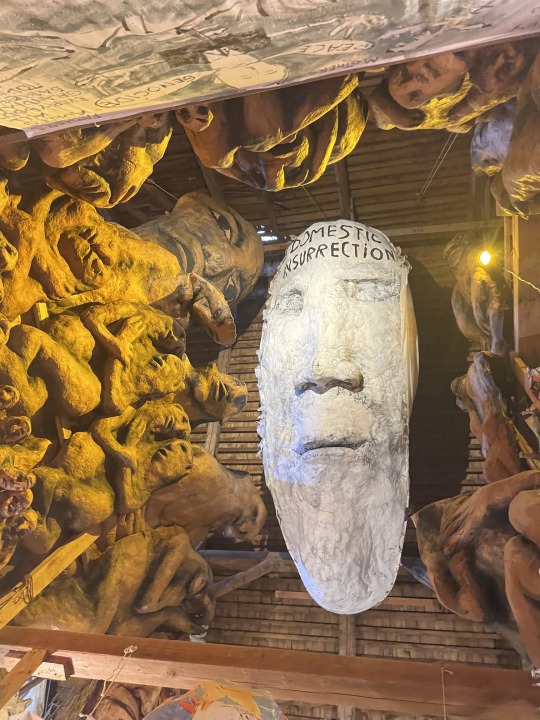
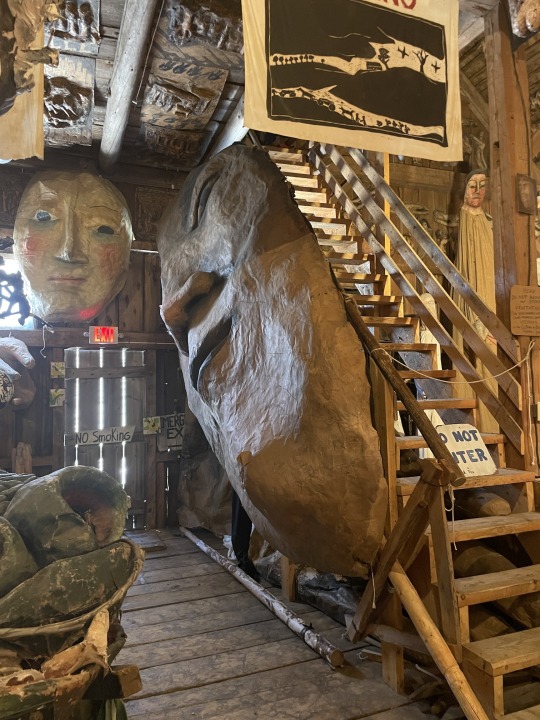
Bread & Puppet Theater, Glover Vermont
#bread & puppet#politically radical puppet theater#anti capitalism#puppets#Peter Schumann#Erika Schumann
20 notes
·
View notes
Text
putting aside the fact that the united states has interfered with more elections than any other nation that has ever existed, it's also odd to insist that the only logical reasons one would have to become disillusioned with the cyclical nature of electoral theater or the united states empire itself, is because of the influence of some foreign-created bots and not, say, living with the misery caused by the policies that the state itself imposes.
the people we're talking about here are subjected to all sorts of violations, from militarized police preventing access to goods and basic services, the disastrous effects of climate change, the constant turbulence of the economy making life unaffordable, the omnipresent stigmatization and scapegoating of homeless populations, sex workers, immigrants and felons (particularly those of color) for "crime", and so on...
...but it isn't because all of these things have been directly caused by or gone ignored by politicians and their corporate puppet masters, and that people are smart enough to realize that this flow of power from the top down won't change simply because we vote once every 4 years, oh no. it's simply the result of some shadowy hacker infecting the minds of impressionable people with anti-american propaganda with memes to weaken our patriotic resolve. they've broken through the conditioning we've experienced through at birth and surrounds us constantly by posting in the comments of a facebook post or tiktok where everyone goes for their political education.
we shouldn't be ignorant to the fact that world powers do indeed regularly struggle for supremacy on the world stage and have been known to engage in highly secretive, elaborate plots to topple each other, so this much is obviously true. however, the assertion that every criticism or conflict of interest and values can be reduced to being the product of outside agitation, that the people making a fuss have all had their brains washed is absurd and disgustingly offensive if not evidence of motives equally as shady as that of the alleged infiltrators themselves. it's likewise totally dismissive of the historical work of radicals globally to build a revolutionary anti-authoritarian anti-imperialist consciousness and inspire action on that front.
in addition to competition, world powers also frequently collaborate as well in the form of trade, so they have a good reason to hesitate to do anything that would permanently disrupt the flow of capital much less endanger their very existence unless there's some kind of achievable goal worth the risks. the ruling classes of these nations are not self-destructive fools despite the pageantry and flair -- they are businessmen seeking to preserve their power and impose social relations understood as essential to making this process easy for them.
so, that might entail interfering with elections in various ways but it also entails making sure not too much is disrupted overall -- riots, mass liberatory movements and strikes are all bad for business.
if these bots were really so invested in the fall of the american empire then we'd have to contend with the fact that the logical conclusion of this concept would apply to not only this empire, but all of them, globally -- since it would be pointless to criticize the destructive nature of one nation while leaving the rest untouched as if they didn't/don't engage in similar activities or play a role in enabling it.
the double standard couldn't be more apparent. fear about an invisible enemy lurking in the dark corners of the internet attacking "us" through misinformation and bad vibes when this entire "democratic" system's existence was founded by lies, its leaders engaging in underhanded trickery and plunder on a grand scale, yet when its them and their supporters who become the targets, they cry wolf and start accusing everyone with something less than positive to say as being a secret spy for the kremlin, or something. fuck off with that.
3 notes
·
View notes
Text
>reading about a "politically radical puppet theater" of fucking course it's in vermont
4 notes
·
View notes
Text
Reflections on the History of Sofia’s Puppet Theater | A Legacy of Imagination and Cultural Resilience

Nestled in the heart of Bulgaria’s capital, Sofia's Puppet Theater is more than a stage for children’s amusement—it is a cultural institution that has nurtured imagination, storytelling, and artistic expression for generations. Reflecting on its history is not simply an exercise in nostalgia, but an exploration of how a seemingly whimsical art form has withstood political upheavals, technological evolution, and changing public tastes to remain a vital thread in Bulgaria’s cultural tapestry.
The Sofia Puppet Theater was officially established in 1946, in the shadow of World War II and on the eve of a new political order under communist rule. Like many other Eastern European artistic ventures of the time, its inception was part of a broader state-supported effort to promote accessible art and education to the masses. However, unlike the more overtly propagandist art forms of the era, puppet theater occupied a unique and often protected space. Its focus on children and fairy tales allowed for a surprising degree of creative freedom, even during periods of ideological constraint. What stands out when tracing the Theater’s development is how it evolved artistically without abandoning its roots.
While initially reliant on traditional European tales and characters, the Sofia Puppet Theater soon began to explore Bulgarian folklore and original works. Puppetry, with its blend of visual art, performance, and music, became a medium through which Bulgarian identity could be both preserved and reinvented.
The theater offered more than mere entertainment; it gave children—and adults—a space to engage with cultural narratives that were deeply embedded in the national psyche.
Reflecting on its legacy also means acknowledging the skilled artists who brought it to life. Puppeteers, voice actors, set designers, and musicians each contributed to a form of theater that required precision, patience, and passion. It is perhaps one of the more humbling aspects of puppetry: the performers themselves often fade into the background so that their crafted characters can shine. This self-effacing artistry deserves recognition, particularly in an age where individual celebrity often eclipses collective effort.
The post-communist period posed new challenges. With the rise of digital entertainment and shifting educational philosophies, the relevance of live puppet theater was questioned. Yet, Sofia’s Puppet Theater persisted. It modernized, embraced new technologies, expanded its repertoire to include interactive and multimedia elements, and deepened its engagement with contemporary themes. Its resilience is a testament to the enduring human need for live, shared storytelling—especially in an increasingly virtual world.
As someone reflecting on the history of Sofia’s Puppet Theater, I find its journey to be one of quiet heroism. It did not rise to prominence through revolution or radical reinvention, but through consistency, care, and creativity. It reminded us that storytelling—especially when delivered through the delicate, expressive hands of a puppet—can be a force of unity, education, and joy.
In a city where ancient ruins meet modern ambition, the Puppet Theater stands as a symbol of continuity and cultural richness. Its history is not merely that of a building or institution, but of an evolving dialogue between generations, bound together by strings of imagination.
0 notes
Text
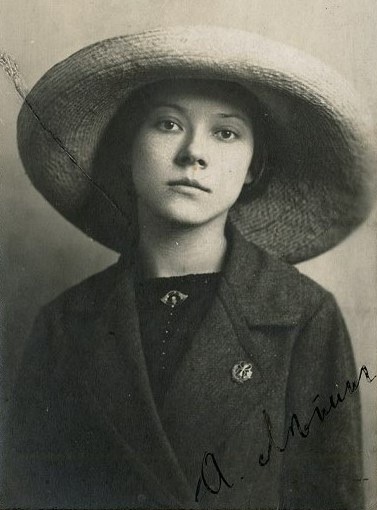
This is Asja Lācis. A name forgotten for most of a century, her importance in the history of radical politics, thought, pedagogy, and theatre can’t be overstated.
She was the girlfriend of quite possibly the most influential theoretical writer of the 20th century, Walter Benjamin. She was Latvian, and was instrumental in the proletarianization of art in the early post-revolution Soviet Union — also a renowned expert on children’s theater, devising a revolutionary pedagogy. She introduced Bertolt Brecht, the greatest playwright of the 20th century, to the theorist of experimental theater that would forever radically change his work and secure its redoubled place in history. In her time, she was known around the Soviet world as preeminent purveyor of the artistic avant-garde. She was also a puppeteer.
Asja — adorable, young, politically outspoken (as a left Marxist) and fearless, inexhaustible, with a ferocious intellect and a lust for adventure that burned in equal brightness, esteemed, socially uninhibited. Walter Benjamin, older, politically and spiritually at a bit of a dead end, painfully awkward and quietly but numinously brilliant, bookish. She and he traveled Europe together over the course of the 1920s, and he told her at enormous length and detail of his nearly unreadably dense and opaque university-rejected monograph on German baroque tragic theater, a dizzying and cerebrally teeming thing, more about the “representation of eternal ideas…the ‘constellations’ of truth” which Lācis finally had to simply lay to rest, firmly stating a litany of clear objections to his thesis. She also met Gershom Scholem, the great Kabbalah scholar and Benjamin’s mentor and perhaps best friend, who was at the time trying to persuade him to settle in Palestine—to embrace Zionism. Benjamin waffled as he often did, under the imposing weight of his older friend, and Lācis finally cut in, unable to bear the thought: “the path of thinking persons leads to Moscow, not Palestine.” That decided that.
But her influence on him far exceeded any of these nudges. He was intoxicated by her impassioned, reasoned, humanistic devotion to that early horizon of revolutionary change and possibility. She’d devoured Marx, and Benjamin at the time still hewed to a kind of old anarchism. But he knew that history was in motion, proving the truth of her Marxism, and the result of this change of heart was the chronicle of texts headed under the name One Way Street — without whose existence, with its invention of the “imminent (or internal) critique” of the objects and things of culture and commerce we could hardly say Adorno, Marcuse, Horkheimer, Habermas, or any of the major thinkers of the new Marxian critical theory could have existed as they did. By the 60s their thinking had permeated radical social movements across the West, owing their method to texts of OWS like the Lācis-Benjamin joint masterpiece on Naples (“Naples”). The imprint of Lācis, the worldly, astonishingly brilliant and beautiful artist and provocateur lives forever in the discourse and assumptions taken for granted by the left, filtered through the crystalline literary magic of a man who saw himself first and foremost as a book collector.
1 note
·
View note
Text
The Bread and Puppet Collection (Videos and Texts, The Bread and Puppet Theater, 1972-2015)
Video recordings and printed material from the politically radical puppet theater. They've been performing since 1963, and they're still going 60 years later! (Website, Instagram, Facebook)
Here's a documentary, and in case you can't find it, here's Part 2 of 2015's Overcarelessness Circus.




#internet archive#video#videos#zines#documentary#documentaries#puppets#puppetry#theater#anti capitalism#1970s#1970's#70s#70's#1980s#1980's#80s#80's#1990s#1990's#90s#90's#2000s#2000's#00s#00's#2010s#2010's#10s#10's
2 notes
·
View notes
Photo

Puppet Love.
Puppeteer Sarah Thomson relives her childhood through the new Sesame Street documentary Street Gang, and recommends 20 more puppetry films for both felt novices and reticulated foam professionals.
To an Antipodean of a certain age, the brownstones of Spike Lee’s Do The Right Thing looked incredibly familiar. Not because we’d ever visited Stuyvesant Avenue, Brooklyn, or even New York, but because they looked like Sesame Street.
Such was the reach and power of the Children’s Television Workshop phenomenon. In making a concerted effort to connect with inner-city children in post-war America’s lower socio-economic neighborhoods, Sesame Street not only platformed and validated those same inner-city neighborhoods within American homes, but had also broadcast a version of them to the rest of the world.
I grew up in New Zealand with a version of that neighborhood as my kind-of babysitter, courtesy of well-worn VHS tapes of Sesame Street and The Muppet Show. And, when I saw Lee’s aforementioned classic (at probably too young of an age), detailing racial tensions and police brutality, wondered whether Oscar the Grouch was in Mookie’s trash can. I also grew up to be a puppeteer. Funny that.

Trailblazing ‘Sesame Street’ producer Joan Ganz Cooney and friends on set.
The notion that entertainment for children could be both educational and compelling; both targeted and of broad appeal, is a notion that has been core to all the children’s entertainment I’ve ever been lucky enough to be involved with. And as Street Gang: How We Got to Sesame Street lovingly shows, it was Children’s Television Workshop—and force-of-nature producer Joan Ganz Cooney—who really wrote that playbook. Making television with heart and attention to detail, but also with all the audience testing and social sciences usually reserved for Madison-Avenue clients, Sesame Street was, as one archival talk-show clip puts it, “what television would do if it loved people, instead of trying to sell to people”.
Not all felt and warm fuzzies, there’s also a bittersweetness to Street Gang. Interviews with the children of seminal figure Jon Stone, composer Joe Raposo, and the legendary Jim Henson lean more than a little into the idea that teaching the world’s children might often come at the expense of your own. And the permeating, unifying political ideology shown in its wonderful archival footage of the Street’s early days is a little lacking on modern Sesame Street, with Frank Oz (the original Bert, Grover and Cookie Monster, as well as Miss Piggy, Animal, and Yoda) dubbing it a “shadow of what it was”.

Jim Henson, Frank Oz and ‘Sesame Street’ director Jon Stone. / Photo by Robert Fuhring courtesy Sesame Workshop
But when it was great, god it was great: Stevie Wonder and Grover; Big Bird learning about mortality; Oz and Henson’s sublime Bert and Ernie comic interplay; The Pointer Sisters teaching you to count; hilarious parody; jaw-dropping guest stars; sensational music; and (don’t tell my Muppet family, but) Kermit the Frog’s personal theme isn’t ‘Rainbow Connection’, it’s Joe Raposo’s beautiful, multi-layered ‘It’s Not Easy Being Green’.
Street Gang: How We Got to Sesame Street—based on the book of the almost-same name by Michael Davis, and very much focused on the early years of a show now into its sixth decade—oozes with the same heart and care that the first decades of its subject are full of. Marilyn Agrelo’s film, produced by Trevor Crafts and Ellen Scherer Crafts, is a real love letter to the potential of creativity in education and state-funded content that prioritizes people over profit.
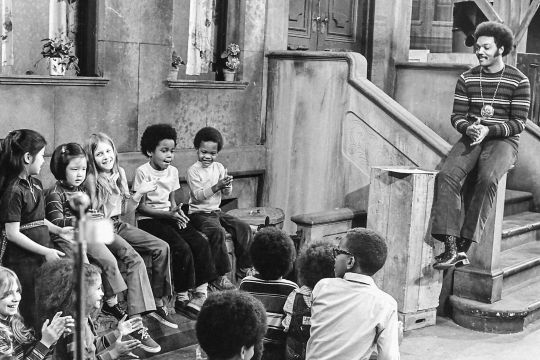
“I am somebody!” Reverend Jesse Jackson and kids on ‘Sesame Street’.
Before he appeared on Sesame Street in 1971, Reverend Jesse Jackson compelled the readers of his column not to miss the 1970 Sesame Street Cast Tour:
“Children shouldn’t miss this as it is one of the most creative and innovative education forms in mass media today. What ought to make you happy is that Black people are involved from the outset. They are everything from production editors and writers to actors and the message of Sesame Street is that children don’t live in a little lily-white world but on streets and in real neighborhoods, in cities as well as suburbs that all types of people are involved in making real.”
48 years later, in 2018, the Sesame Street gang came 8,944 miles to my neighborhood, with Oscar-winning ‘Man or Muppet’ composer Bret McKenzie as their human song partner (the show was in his hometown, handily). Performing live, the characters onstage had helped raise the adults in the audience, now present in great numbers, with their own enthralled children in tow. The gang’s a little different these days (most heritage characters are now in new pairs of very caring hands) but the song remains the same: one of laughter, inclusion and compassion.
In an increasingly fragmented world, with an ever-growing focus on the individual, perhaps the most radical thing we can continue to ask children might just still be: “who are the people in your neighborhood?”.
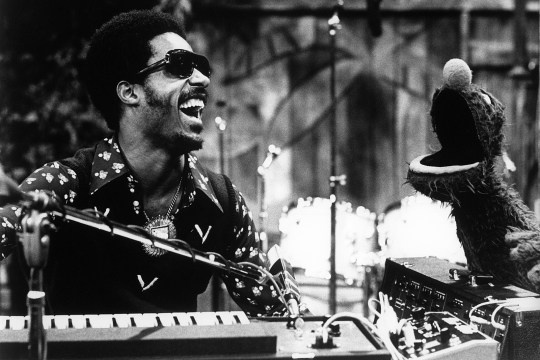
Not enough puppetry in your media diet? Whether you’re a felt novice or a reticulated foam professional, here is a list of twenty further places to travel into the magical realm of puppets.
Related content
Andre’s list of 100 Best Stop Motion, Puppets, Marionettes and Gekimation
Brianna’s Worlds of Puppetry mega-list and dozens more puppetry documentaries
Tom’s list of Muppets feature films and specials
Puppet Movies (That Aren’t The Muppets), a list by TheDude3445
A Filmmaker Five from puppet-loving director Quentin Dupieux
Follow Sarah on Letterboxd
‘Street Gang: How We Got to Sesame Street’ is screening in select theaters and is streaming now on VOD.
#letterboxd#the muppet show#muppets#muppet movie#kermit#sarah thomson#puppetry#puppeteer#jim henson#joan ganz cooney#marilyn agrelo#street gang: how we got to sesame street#street gang#reverend jesse jackson#stevie wonder#grover#bert and ernie#frank oz
7 notes
·
View notes
Text
Roadtrip Rewind
Where did we leave off… After Bozeman I took two days driving through Montana, South Dakota, and Minnesota to get to Minneapolis, where I met up with Zoey. We spent two nights there, one night in Madison, two nights in Detroit, one night camping in upstate NY, and one night camping in New Hampshire after a day in Vermont. The next day I dropped Zoey in Portland and drove up to boat school. A few highlights:
In Minneapolis we stayed at 300 Clifton, this old mansion in the Loring Park neighborhood that was recently restored and is now a 10-room hotel/B&B (it’s on AirBnb!). It was spooky and fun and way cheaper than some shit motels I’ve stayed in. It’s probably haunted which is a plus for me. Also there were free scones. Another thing that makes me feel like I’m getting older - I’m starting to like all the dry biscuity foods I’ve always hated (scones, muffins, biscuits, shortbread).

There must have been a little cyanide in my tea
My claim to fame - we went to a camera store to get our film developed and the person who helped us shouted me out on their Instagram! 🥰 And they happened to know the guy from the camera shop in Portland where we bought our stuff earlier this summer and tagged him too, sweet small world of vintage cameras.


Golf courses are a waste of space
I love Crossing to Safety by Wallace Stegner so I’ve had romantic ideas about Madison for a long time and thought maybe I would want to go to grad school there. In reality it was kinda weird and sterile which is a bummer because they just announced the UW Madison Transdisciplinary Center for Research in Psychoactive Substances with a focus on therapeutic applications for psilocybin and MDMA #therapygoals
John K. King Used and Rare Books in Detroit is massive and chaotic. Loved it! We were hunting for Caliban and the Witch by Silvia Federici and we met two hella hot and tall employees who were very invested in helping us find the book. One wrote the title down and said he was looking to read more feminist anti-capitalist texts… Like okkkk fucking marry me and read to me in bed until the day that I die!! If I published a hot socialist bookstore employee calendar would anybody buy it?? These two guys would be May and November. I have a copy of Caliban and the Witch sitting in my AbeBooks cart with the shipping address: “Sexy Employee 4th Floor - You Know Who You Are, c/o John K. King Used and Rare Books, 901 W Lafayette Blvd, Detroit, MI 48226.” Venmo me $1 if you care to support my missed connection quest.
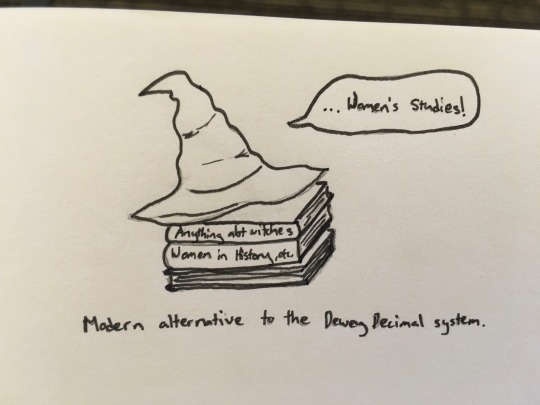

Laughed out loud…one million books in the store and this is their choice of doorstop
Our hostel in Detroit was in the Corktown neighborhood and next door was the Pink Flamingo pop-up which has been happening there every Thursday for the past ~six years. It’s basically an airstream serving a rotating food and drink menu and a cool hangout spot with music and firepits. We had a fruit plate cuz we’d been eating straight junk for days while the DJ made an impromptu and rambling fireside speech about community and the meaning of life. Near the end the airstream hostess started handing out free rice balls as an apology.
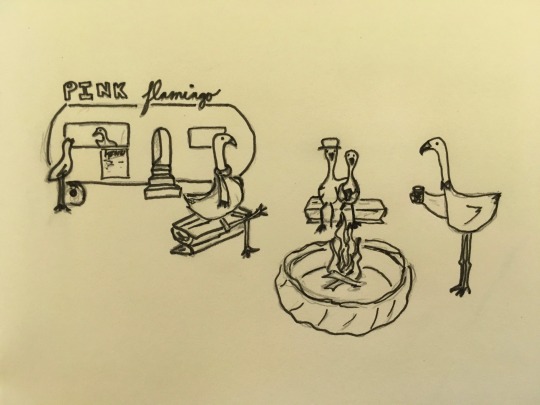
After Detroit we had two long drive days to get to Vermont where we had maple creamees at Bragg Farm Sugarhouse (shoutout to our friend and former housemate Brett for the recommendation!) and caught one of the last Bread and Puppet shows of the season (if you haven’t heard of Bread and Puppet it’s a political/radical puppet theater company based in Glover, Vermont). Holy shit Vermont is so beautiful it’s like a magical hobbit land. The lady at Bragg Farm tried to recruit me to come back and work through the spring maple sugaring season, maybe I should. Straight maple syrup is the new Red Bull.



And that’s it! I can’t believe I drove myself all the way here. Thanks to Zoey for the company and cheers to a summer of buses, bookstores, bikes, and backpacks.

Before I literally burst into tears
Maine is so beautiful and boat school is keeping me busyyyyy. Does anybody know what the hell a woolen is? I think I’m going to need some here. More soon! Send letters or junk mail my way at 440 Old County Rd, Pemaquid, ME 04558.
XOXO
2 notes
·
View notes
Text
Zakaz
Weapons manufacturing and the war industry is Xia’s most lucrative source of profits, so it stands to reason; Once materials are gathered in Voymari, crafted into weapons in Tametru, and shipped from Stelt… Where do they go?
While many of them are shipped out to various crimelords, smaller governments in Xia’s more developed districts, and so on and so forth, the vast bulk of destructive machinery has one common destination in mind; The chaotic desert wasteland, home to various developing countries and nations, the designated district of Zakaz.
A generally arid region with varying levels of heat intensity and dryness, the Zakaz District lagged behind the rest of Xia due to its poor, brutal conditions making development both difficult and ‘nonproductive’ in the eyes of various Xian corporations and nobles. As a result, while areas such as Voymari or Artidax were sought out for their environmental conditions that assisted the sectors that’d be built within them, the scattered clans, tribes, and kingdoms of Zakaz were left on their own to continue fighting. As other parts of Xia readily participated in its industrial revolution, willingly or otherwise, the people of Zakaz were left behind and left mostly ignorant of the new progress, busy fighting over what few resources were present in Zakaz.
Inevitably, Xian weapons manufacturers, including the esteemed Vortixx Industries, recognized that a wartime economy was incredibly profitable to them. Massive sales were made towards various groups in Zakaz, who were eager to get any advantage they could over their enemies; In turn, the powerful weapons they used further devastated Zakaz, throwing back any attempts to develop the region to the urban and technological standards of the rest of Xia. This vicious cycle continued, and because many Xian corporations found it in their best interests for Zakaz to remain war-torn, wanting to sell weapons, the conflict would continue.
Many nations in the Zakaz District are hosted by puppet leaders with corporate ties, while others remain independent. Because Xian weapons manufacturers desired the continued existence of war for profits, any attempts to organize Zakaz’s nations into a tense equilibrium and ceasefire have ended, deliberately fueled by corporate sabotage, political assassinations, and of course the nationalism, prejudices, and attitudes found in the Zakaz District.
Whereas the rest of Xia’s districts are mostly cohesive (or were in Nynrah’s case), Zakaz is viewed as the back-water, third-world region where the ‘barbarians’ of Xia reside, although such a perspective fails to capture the socioeconomic reasons behind Zakaz’s conflicted state. Regardless, Zakaz consists of various, scattered groups, ranging from nomadic tribes and clans, to bandit gangs, mercenary groups, cults, small nations and kingdoms, and so on and so forth. The intense, dry desert heat has evaporated almost all water, save for Lake Tajun; Xia’s primary source of clean, untouched water.
Because clean water is both so rare and so precious for Xians, everyone on the island has come to the mutual, ceasefire agreement to regard Lake Tajun and its shores as a place of neutrality. No destruction or warfare is to happen here, because it is in everyone’s best interests for Lake Tajun to remain pure and pristine. The shores along Lake Tajun are pristine oasises, and many Xian nobles travel to luxury resorts on vacation there. A few cities and villages have been built along the shore of Lake Tajun, harvesting water and selling it across Zakaz to the needy and thirsty. It is not uncommon to find ‘Water Merchants’ travelling across the Zakaz desert, selling their wares while also being armed against potential bandits, such as the roaming Bone Hunters.
Aside from Lake Tajun, Zakaz is not an entirely homogenous desert; While its arid conditions somewhat vary, the effects of various Xian Hearts and their destructive capabilities can be felt. Areas where a Xian Heart of Fire has been detonated are scorched, burning plains of glass that can blind at a glance; A Xian Heart of Water mixed with sand has resulted in a hazardous Sea of Quicksand that seems to be spreading at a slow, yet definite rate.
Because Lake Tajun is neutral ground where peace treaties and other agreements are signed, all other sources of water and fertile soil are brutally fought over. Nations and clans will fight not only over resources, but also ideological disputes related to Nationalism, with upstart dictators promising order and a new law, but only if citizens devote their minds, bodies, and lives to expanding their cause. Most countries in Zakaz usually last shortly before they either collapse, or undergo a radical change of leadership, either due to corporate interests, rebellion, or some other coup or the victory of a superior nation. Many leaders have sold out their own nation and its precious resources, from Thornax crops to oil fields, to corporate interests who will pay the dictators themselves much and the citizens very little.
Travelling across brutal areas of Zakaz, such as the Baran Desert, travelers may sight an oasis and even a tavern beside it, although sometimes these are illusions, mirages from impending heatstroke and the scorching light. Sandstorms and hazardous wildlife, such as the massive Sand Bat, are constant threats, amidst the risk of heatstroke, starvation, and thirst. Bone Hunters will stalk after victims amidst their Rock Steeds, often hiding within the cover of sandstorms to ambush prey.
Zakaz’s politically unstable nature means that Dume and other Powers That Be have little hold and authority there, and Vahki presence is practically minimal. As a result, many upstart tyrants and power-hungry warlords and criminals escape to Zakaz to flee the repercussions of the law, or to conduct business that would be seen as ‘suspicious’ and shut down quickly by the Vahki. Cults are common, such as the Sisters, a group of enigmatic telepaths who worship a figure named ‘Annona’; Or the Kraahl, a mysterious coven of cloaked, masked figures who have been sighted at one moment, only to suddenly disappear at the next.
Besides bandits, there are also mad inventors, political dissidents fleeing other districts (or Zakaz itself), refugees, etc. Slavers frequently roam Zakaz, picking off travelers or refugees and selling them off to brutal owners. Zakaz is Xia’s primary source of slaves. Many Bioweapons are deployed in combat within the Zakaz District, with some becoming free of their masters and roaming the wastes. While some inevitably die, others continue to thrive, with one notable example being the Tesara, a massive carnivorous plant that lives in symbiosis with a village of Xians within the Baran Desert.
In spite of Zakaz’s wartorn state –or perhaps BECAUSE of it- the district is also Xia’s primary form of ‘entertainment’. In a more developed region near Lake Tajun is a series of film studios and theaters, most owned by the famous Kratakal, where shows, big-budget movies, and plays are performed, filmed, and broadcast to the rest of Xia. Tickets are frequently sold out, with packed audiences eagerly watching Kratakal’s various performances and programs as Xia’s primary, beloved form of escapism. Luxurious casinos promise massive gains but only provide losses, with many becoming indebted thanks to their own gambling addictions and sold into slavery as punishment, or forced on the run to avoid consequence.
Elsewhere across Zakaz are various arenas where gladiators brutally fight, often to the death. Fighters can consist of just about anything, from regular Xians, slaves, outlaws, animals, and even outright Bioweapons. With Gladiator fights of so much entertainment to disenfranchised Xians, the sport is broadcast to other districts, and has spread to them as well; However, Zakaz has the most gladiator fights of all. Particularly famous fighters with a long streak of victories can even be rewarded with the title of ‘Glatorian’ to honor their legendary prowess. Particularly famous Glatorian who garner many views will even be invited to participate at the Atero Magna, the massive coliseum deep within the heart of Xia itself. Bets are held, often with dire consequences for losers, and mercenaries will enforce these bets at the betting offices.
In some areas of Zakaz, such as the Baran Desert, gladiator matches aren’t just used for sport and entertainment, but also to settle conflicts and disputes; With some tribes not wanting to be blown into oblivion by conflict, nor further scar the environment, they resort to proxy individuals to settle disputes in favor of actual armies. Started by the legendary Glatorian known as Certavus, this regional system of gladiator matches is closely regulated and has many laws, but such rules are not always strictly followed. Tribes arguing over claims to a resource can send forth their best fighter –or a hired gladiator- to fight and win on their behalf.
While many of these gladiators get benefits, others are given the short end of the stick, especially slaves sold into combat. Unsurprisingly, some gladiators, unhappy with their end of the deal, have begun to conspire with one another, forming a network of connections and alliances. Such alliances involve deals from intentionally losing matches for personal gain, recommending one another and new recruits to be used, and so forth. Growing gladiator alliances will agree to set higher prices for one another, and brutally defeat and out-compete others who aren’t with them. The former slave Tuma is rumored to be at the heart of this emerging ‘Glatorian Monopoly’ that seeks to put the power into the hands of the fighters themselves; Those wary of Tuma have sent in Baterra model Exo-Toa to spy on him, just in case.
Aside from duels and death-matches, there are also brutal death-races. Zakaz races are poorly regulated and often impromptu, not necessarily done by official organizations, but nevertheless used as a means of entertainment, prize-money, fame, and occasionally to settle disputes. Famous racers include Kirbraz, Scodonius, Reidak, Perditus, Crotesisus, etc. Sabotage and violent crashes are of course, common. And if racing isn’t one’s personal cup of tea, there are also other sports, such as Akilini, a disk-throwing sport with far too few safety regulations.
Many groups vie for power and control in Zakaz. There is the Skakdi Clan, led by Nektann and consisting of Xians modified by the rogue Nynrah Ghost Spiriah; or the mad inventor Telluris, who sees just about anyone and everything as an enemy, frequently rampages around mindlessly on his Skopio XV-1. The Iconox Clan is located within the frosty ruins of a Xian Heart of Ice, and frequently competes with the Vulcanus and Agori clans. Paramilitary death squads are often put into conflict with rebel cells in guerilla warfare. But despite all of this conflict, Zakaz has yet to see a clear, definitive ‘winner’.
#bionicle#Bionicle RaE#zakaz#xia#glatorian#skakdi#nektann#bone hunters#agori#bara magna#worldbuilding#lore
5 notes
·
View notes
Photo

LGBTQIA+ Historical Romance Novels...International Locations
Historical romance novels tend to center on a few locations, despite the large mass that is our globe. Here’s a list of romances that don’t take place in England or New England.
Beautiful One: An LGBT Historical Romance by Kerry Adrienne - Ancient Greece
In Athens, the Great Dionysia festival rouses citizens with wine, song, theater, and debauchery. Politics and scandal paint deep shadows across the portrait of the city, and wolves in sheep’s clothing roam the streets and the stage. Shy Kallistos faces Sophocles in the theater competition, play for play against the celebrated master. Success beckons like a siren’s song, but the dark allure and smoldering desire for a new acquaintance rouse feelings Kallistos never imagined he’d feel. Alexios spent many cold nights singing to the sheep and stars before traveling to Athens to help Sophocles. He longs to feel the breath of audience applause on his face and will do anything to become a famous actor. Now, losing his heart to the competition forces him to make difficult choices that may jeopardize his lifelong dreams. Of Minotaur masks and men…where is life truly lived? On the stage or in the heart? This book was first published in 2013. It has been significantly revised to release here.
Rebellion by Naomi Aoki - China
1899, political tensions are rising with the emergence of the Boxer Movement in Northern China, straining ties between the Chinese Imperial Government and the Eight Nations with stakes in the country. As a Captain in the Royal Marines, Alfred Cartwright is deployed to Shanghai, where he discovers more than he’d dared to dream of – Love. Not even the struggles with language or the fear of reprisals if their relationship is found out, can stop Alfred from falling for the Chinese man he encounters. But as the ant-foreigner sentiment of the Boxer Movement grows in strength, their relationship will be put to the test.Where do Alfred’s loyalties lie? With the man he loves or his country, as they stand opposite each other on a battlefield neither can escape.
Shadowrunners by Alex Assan - Fantasy Chicago-style
“A thread all about my queer noir webcomic Shadowrunners.com ; historical fantasy comic where the alcohol prohibition in the 1920s is instead a prohibition of COLOUR! 🎷🍸💚 via @alexassanart on Twitter”
A thousand years ago, the last colour in the world faded to grey. Now, after the great archaeological discovery of Queen Sorizahana’s shade-stocked tomb, it stands ready to enter the world again. Ironwell City will become the birthplace of the burgeoning colour industry, where colour is pumped out of factories, poured into perfumed bottles and sold at exorbitant prices to those wealthy enough to afford the luxury.
At least, that’s the plan according to the Five Financiers of the Sorizahana excavation.
One part Prohibition fantasy, one part Robin Hood, and a whole lot of epic heist, Shaderunners follows a group of ragtag bootleggers and bohemians who band together in an effort to steal colour from the wealthy echelons of Ironwell’s high society. Among them: a philosopher, a puppeteer, a gutter rat, an opera singer, a naval officer and a hopeless romantic. Together, they run The Glass Dial, former watch shop and future night club, where all the house drinks run red.
Speak easy, pal, ‘cause the road to ruin is paved with good intentions.
Labyrinth by Alex Beecroft - Ancient Knossos (Beautiful origin story of a myth, with a nonbinary MC.)
- Kikeru, the child of a priestess at the sacred temple of Knossos in ancient Crete, believes that the goddesses are laughing at him. They expect him to choose whether he is a man or a woman, when he’s both. They expect him to choose whether to be a husband to a wife, or a celibate priestess in the temple, when all he wants to do is invent things and be with the person he loves. Unfortunately, that person is Rusa, the handsome ship owner who is most decidedly a man and therefore off-limits no matter what he chooses. And did he mention that the goddesses also expect him to avert war with the Greeks? The Greeks have an army. Kikeru has his mother, Maja, who is pressuring him to give her grandchildren; Jadikira, Rusa’s pregnant daughter; and superstitious Rusa, who is terrified of what the goddesses will think of him being in love with one of their chosen ones. It’s a tall order to save Crete from conquest, win his love, and keep both halves of himself. Luckily, at least the daemons are on his side.
The Crimson Outlaw by Alex Beecroft - 18th century Transylvania (High adventure, with not a single vampire.)
- Love is the greatest outlaw of all. Vali Florescu, heir to a powerful local boyar, flees his father’s cruelty to seek his fortune in the untamed Carpathian forests. There he expects to fight ferocious bandits and woo fair maidens to prove himself worthy of returning to depose his tyrannical father. But when he is ambushed by Mihai Roscat, the fearsome Crimson Outlaw, he discovers that he’s surprisingly happy to be captured and debauched instead. Mihai, once an honoured knight, has long sought revenge against Vali’s father, Wadim, who killed his lord and forced him into a life of banditry. Expecting his hostage to be a resentful, spoiled brat, Mihai is unprepared for the boy to switch loyalties, saving the lives of villagers and of Mihai himself during one of Wadim’s raids. Mihai is equally unprepared for the attraction between them to deepen into love. Vali soon learns that life outside the castle is not the fairy tale he thought, and happy endings must be earned. To free themselves and their people from Wadim’s oppression, Vali and Mihai must forge their love into the spear-point of a revolution and fight for a better world for all.
Side Note...Alex Beecroft also has a collection of novels that take place in the Caribbean.
The Celestial by Barry Brennessel - 19th century California
- Love was the last thing Todd Webster Morgan expected to find while searching for gold in 1870s California. But that was before he met Lao Jian. Hardened beyond his nineteen years, Todd Webster Morgan is determined to find gold high in the Sierra Nevadas. But his dream is violently upended. Complicating matters even more, he meets a young Chinese immigrant named Lao Jian, whose own dreams of finding gold have been quashed by violence. But life back in Sacramento isn't any easier. Todd's mother struggles to make ends meet. His invalid uncle becomes increasing angry and violent. Todd seeks employment with little success. Meanwhile his friendship with Lao Jian turns to love. But their relationship is strained as anti-Chinese sentiment grows. Todd vows not to lose Lao Jian. The couple must risk everything to make a life for themselves. A life that requires facing fear and prejudice head on.
Provoked by Joanna Chambers (Enlightened Book One) and Beguiled (Book Two) - Scotland
- Tormented by his forbidden desires for other men and the painful memories of the childhood friend he once loved, lawyer David Lauriston tries to maintain a celibate existence while he forges his reputation in Edinburgh’s privileged legal world. But then, into his repressed and orderly life, bursts Lord Murdo Balfour. Cynical, hedonistic and utterly unapologetic, Murdo could not be less like David. And as appalled as David is by Murdo’s unrepentant self-interest, he cannot resist the man’s sway. Murdo tempts and provokes David in equal measure, forcing him to acknowledge his physical desires. But Murdo is not the only man distracting David from his work. Euan MacLennan, the brother of a convicted radical David once represented, approaches David to beg him for help. Euan is searching for the government agent who sent his brother to Australia on a convict ship, and other radicals to the gallows. Despite knowing it may damage his career, David cannot turn Euan away. As their search progresses, it begins to look as though the trail may lead to none other than Lord Murdo Balfour, and David has to wonder whether it’s possible Murdo could be more than he seems. Is he really just a bored aristocrat, amusing himself at David’s expense, or could he be the agent provocateur responsible for the fate of Peter MacLennan and the other radicals?
Peony Lanterns by Patricia Correll - Japan
Mitsu has been Shiro’s personal servant and best friend since they were both six years old, and he’s been in love with him for nearly that long. While Shiro takes lovers of both sexes, the gulf between their social classes is so vast that Mitsu has never spoken his feelings aloud. When Shiro meets the beautiful Lady Keiko, he’s instantly infatuated. His affection soon turns to obsession, and Mitsu resigns himself to a life of unrequited love. But as Mitsu looks deeper into Keiko and her motives, he realizes that Shiro is in grave danger. He will need all his courage-- and some help from a master of the occult-- to save the life of the man he loves.
Miranda in Milan by Katharine Duckett (f/f!!!) - Milan
With Miranda in Milan, debut author Katharine Duckett reimagines the consequences of Shakespeare’s The Tempest, casting Miranda into a Milanese pit of vipers and building a queer love story that lifts off the page in whirlwinds of feeling.
After the tempest, after the reunion, after her father drowned his books, Miranda was meant to enter a brave new world. Naples awaited her, and Ferdinand, and a throne. Instead she finds herself in Milan, in her father’s castle, surrounded by hostile servants who treat her like a ghost. Whispers cling to her like spiderwebs, whispers that carry her dead mother’s name. And though he promised to give away his power, Milan is once again contorting around Prospero’s dark arts.
With only Dorothea, her sole companion and confidant to aid her, Miranda must cut through the mystery and find the truth about her father, her mother, and herself.
Muffled Drum by Erastes
Bohemia, 1866 They met in a port-side tavern, their lust-filled moments stolen from days of marching and madness. After eighteen months, Captain Rudolph von Ratzlaff and First Lieutenant Mathias Hofmann have decided to run away from everything they hold dear. Resigning their commissions is social suicide, but there's no other choice. Someone will eventually see Rudolph's partiality toward Mathias. Now their plans have gone horribly awry... When Mathias goes to Rudolph's tent after their last battle, his lover looks at him without a hint of recognition. Mathias can hardly believe the man he knew is gone. He wants to fill in so many of Rudolph's missing memories, but the doctor says a shock could result in permanent damage. The pain of seeing Rudolph on a daily basis, when Rudolph doesn't remember their love, is excruciating. Now Mathias must decide whether he wants to fight for the man he loves or forget him completely...
Brought Forth by Josie Finch - Virginia
Henry Merrill escaped the abusive family from his childhood and has built a life as the kindhearted handyman for the small town of Ashford in the 1880’s. Henry has every intention of living his life alone, serving the town he considers home. But an angel named Cory-Elle has other plans for Henry. With a soul that needs to be brought to earth, Cory-Elle gives Henry the opportunity to raise the family he never imagined he would have. Dr. Lawrence Turner has a bad reputation in Ashford for attending to poor patients who cannot pay him and for being the only physician the town has ever seen make house calls to the local brothel. So when a young man claiming an angel has made him pregnant arrives in his office, Dr. Turner is not surprised. Despite his disbelief, Lawrence has few things to lose in tending to Henry—though Lawrence never counted on his heart being one of those things. With the help of the doctor’s assistant Ben Lockhart and a saloon woman named Lily Mae Pepperidge, Henry and Lawrence must challenge everything they thought they knew about faith and family. Together they encounter pain, joy, sorrow, and pleasure. But among it all, they discover love. Standalone. HEA. Mpreg (Male Pregnancy) is a primary theme. Print version is coming soon.
The Last Concubine by Catt Ford - Japan
When Princess Lan’xiu’s brother delivers her under duress into General Hüi Wei’s harem as a political offering, her only question is how soon her secret will be discovered. She is under no illusions: when the general discovers she is actually a he, death is his only future—though he doesn’t plan to make it easy. Lan’xiu has dressed as a woman all his life, but he is no damsel in distress. He can swing a sword with the best of them.
General Hüi Wei has everything a man could want: power, wealth, success on the battlefield, and a harem of concubines. At first, he regards Lan’xiu with suspicion, but he finds himself strangely drawn to her. When he discovers the beautiful young woman is actually a man, his first reaction is to draw his sword. Rather than waste such beauty, he decides to enjoy the spirited Lan’xiu’s submission—and ignites a passion and desire deeper than anything he’s felt with other wives. But court intrigue, political ambitions, and the general's doubts may be too much for their love to overcome.
A Timeless Dreams title: While reaction to same-sex relationships throughout time and across cultures has not always been positive, these stories celebrate M/M love in a manner that may address, minimize, or ignore historical stigma.
Flying Fish by Sedonia Guillone - 18th century Japan (Book One of the Sword and Silk trilogy)
- In eighteenth century Japan, during the golden age of samurai and of the Kabuki theater, young actors known as “flying fish” traveled the countryside, performing for audiences by day and giving their bodies to their samurai patrons at night. Genji Sakura is one such flying fish, yet he dreams of finding the man he can give his heart to and leave the loneliness of his itinerant life behind. Though he loves theater, he doesn’t love every part of his profession, especially some of the patrons. So when a handsome ronin comes upon him stealing some solitude for a bath in a hot spring and their encounter turns passionate, Genji’s surprised and delighted. Daisuke Minamoto’s past fills his life with a bitterness that grips his soul and makes him dangerous. Yet passion takes him when he spies on a graceful young man bathing naked in a hot spring. He has always loved women, but he can’t deny the call of his heart. After an afternoon of sexual bliss, his heart and soul are tormented and torn. Keeping this miraculous lover will require giving up the one thing that has kept him alive for years: his hatred for the lord who murdered his wife. If he loves another, how will he go on and who will he become?
Well Met in Molos by J Hepburn (trans MC!) - Fantasy Middle East
Zerris is a man of many talents: thieving, procuring, and more, peddling his trades in a city at the edge of the empire and between two cultures. He has a built a life and sterling reputation through guile, cunning, and constant vigilance in hiding what and who he is. Then a cocky stranger barrels through all his careful planning, and a contract goes horribly wrong. As he struggles to recover his plans and save his name, Zerris instead finds his world collapsing, until all that’s left is the first true friend he’d ever had.
Novae Comic by Kaiju - 17th century France http://www.novaecomic.com/
Novae chronicles the adventures of Sulvain, a sweet tempered necromancer and Raziol, a passionate 17th century astronomer. While studying the stars together, a connection forms between them and their relationship blooms. However, when the body of a fellow astronomer is found on the steps of the Academy of Sciences, their lives are entangled in ways they could never foresee.
Japanese Love by Rei Kimura - Edo period Japan through 21st century
- Can a Japanese samurai of impeccable lineage in Edo period Japan get away with being gay? Can he break all the rules of society and get away with it? It all started when an aging samurai took an eccentric interest in a teenage peasant boy who had the unusual gift of writing and one day he brought his son, Lord Okimoto to the peasant’s house. The eyes of the samurai’s son and the teenage peasant met and spawned a forbidden love affair which broke all the rules of Japan’s Edo period society and a feudal class so sharply defined that it could cut like a knife. Four centuries later, an ancestor of Lord Okimoto finds a diary written by his peasant lover unfolding the anguished tale of a forbidden life went wrong, leaving behind a trail of destroyed lives, broken dreams and a few deaths. The spirit of the gay samurai who put duty and obligations above his poignant love travels one whole circle to arrive to the 21st century in a final twist to this intriguing story of how two young men dared to break all the rules in conservative unforgiving 18th century Japan.
Nomad’s Dreams by August Li - Fantasy Middle East
Two men, each with a hidden destiny. Can they defeat a web of deceit and dark magic to ensure their fates intertwine?
Bedouin Isra al-Grayjaab’s dreams lead him to Janan, an amnesiac beggar on the street of Qena—one who steals his heart and starts him on a seemingly hopeless quest. With only their wits, Isra’s knowledge of the desert’s secrets, and the aid of a mercurial djinn, they must recover Janan’s past. But neither can predict his true identity or the lengths others will go to see that his mind remains broken and his true power out of his reach.
In a sweeping romantic adventure that takes them across the Eastern Desert to the modern streets of Cairo and on to the luxurious Red Sea Coast, Janan and Isra seek a truth that will either bring them into each other’s arms or tear them apart forever.
The Farmer’s Daughter by by Robbi McCoy - Hollywood
A butch hobo meets a beautiful girl on a farm while roadtripping in the 1940's. Years later they find each other again in glamorous 1950's Hollywood, but now the farm girl is an aspiring actress. This story has every bit of a happy ending as the couple end up together for something like the next fifty years, but I can't stress enough that this one has trigger warnings (pasted from my Goodreads review: If you are triggered by family abuse/"corrective rape" of a lesbian or of bad guys dying in various realistically violent ways, check out my other book reviews for alternate recommendations instead.)
By The Currawong’s Call by Welton B. Marsland - Australia
- A small town, a new arrival, and a love that is as undeniable as it is unlawful…
Victoria, Australia, 1891 Anglican priest Matthew Ottenshaw receives his first posting in tiny Dinbratten, two days’ ride from his Melbourne home. Determined to honour his calling as best he can, he throws himself into the footy mad, two–pub town, navigating the dusty streets, learning the gossip, and striking up a friendship with Jonah Parks, the resident police sergeant and local bona fide hero.
A police officer and a priest often find themselves needed at the same place, and Jonah and Matthew’s friendship deepens quickly, as they set about their business of protecting the bodies and souls of Dinbratten’s residents. When a bushfire threatens the town, and Matthew’s inexperience with fire endangers the church buildings, Jonah comes to the rescue, and a reckless kiss in the midst of the chaos takes their friendship to forbidden.
Neither Matthew nor Jonah can go back to the way things were before, but continuing their relationship puts everything at risk: their jobs, their friends, even their lives. In the outback town of Dinbratten where everyone knows everything about everyone else, how can they ever expect to keep a secret this explosive?
The Liberators of Willow Run by Marianne K Martin (f/f WWII)
It’s 1943 and the world is at war.
Hope for victory rests on the wings of America’s Liberator, the B-24 bomber. And, with more than nine million Americans on the front lines, there is only one way for the assembly plants to produce enough planes to meet the demand—and that is to recruit women by the thousands into the work force.
Audrey Draper is committed to the war effort, and beyond that, to finding her own personal and financial independence. And she is not alone. Ruth Evans also chooses to seek employment. As a waitress living on her own, she not only searches for freedom, but also a way to fulfill an important promise. And then there’s young Amelia, a fifteen-year-old rape victim who is being forced to return to a dark and dangerous home. Audrey, Ruth, and a handful of these newly independent women must risk everything they have fought so hard to achieve to give one of their own a fighting chance to survive. Set against the backdrop of a rapidly changing world, these women capture the spirit of the times through their determination, ingenuity, and enduring courage.
Interested in more f/f WWII novels? Try these…
Tournament of Shadows by SA Meade - Bukhara (Uzbekistan- being fought over by the British and Russian Empire during 19th century)
In 1842, Captain Gabriel O'Riordan of the 8th King's Royal Irish Hussars is sent on a mission to Bukhara. His task—to try to free two of his compatriots from the clutches of a mentally unstable Emir. On his way, he encounters Valentin Yakolev, an officer in the Russian Army, who is also on a mission—to persuade the Emir that an alliance with Russia would be in his best interests. Gabriel, disguised as a holy man, is not happy to be the object of Yakolev's intense scrutiny. After all, he's working for the opposing team in the Great Game being played between their two nations. When Gabriel realises that his mission is little more than a forlorn hope, a game he has no chance of winning, he's desperate enough to turn to Valentin to help and offer him anything in return. What he doesn't expect is to have his plans to return to Calcutta scuppered by events. Instead, he and Valentin flee north, fighting off bandits, their desire for each other and the hardship of desert travel. Their travails bring them closer together until a secret from Valentin's past tears them apart. Can they set the past behind them and move on together?
Battle Scars series by Charlene Newcomb - Jersulem
March 1190. Brimming with the spirit of youth, the idealistic Henry de Grey joins King Richard’s army ready to fight for God’s glory on the battlefield. But after he bloodies his sword and witnesses the slaughter of innocents, he struggles to justify the violent acts he’s committed. Through months of brutal marches and political bickering, Henry finds comfort in the fearless resolve of a brash veteran. But when his feelings of friendship grow into something more, he must put his old convictions through the gauntlet. Stephan I’Aigle would follow the king anywhere, even into the heart of enemy territory. He takes Henry under his wing, but fears his growing attachment and burning passion could make him lose his fighting edge. Will opening up his heart destroy the knights’ friendship, or leave them both completely defenseless in the heat of battle? Men of the Cross is medieval historical fiction with elements of an m/m romance. If you like journeys of self-discovery, vivid historical details, and slow-burn chemistry, then you’ll love this tale of the knights who served the Lionheart.
Song of the Spring Moon Waning by EE Ottoman - China
Upon waking up one morning, Wen Yu is surprised to find a note asking him to return the song thrush given into his care while the owner was sick. The only problem is that Wen Yu was never given a song thrush. Though he has no time for distractions from his studies for the palace examination, Wen Yu goes in search of the unknown Liu Yi who left him the note. What he finds is a beautiful imperial eunuch, a talking tortoise, and a collection of mysterious moon poems that force Wen Yu to question what path in life he is truly meant to be walking …
Alaskan Bride by Jordan Redhawk - 19th century Alaska (f/f)
- Finding a husband after the American Civil War isn’t easy. When twenty-two-year-old Bostonian Clara Stapleton discovers the address of a likely bachelor in the wilds of the Alaskan bush, she throws caution to the wind and sends him a letter. Soon she’s on the adventure of her life, leaving the comfort and stability of a well-to-do family for a man she’s never met and a life of uncertainty. Callie Glass isn’t happy with her brother Jasper’s proposal to a mail-order bride, though she knows it’s not her call. And when a tragic accident takes Jasper Glass’s life, Callie doesn’t hesitate to call off the wedding in a letter to Clara. Callie is soon surprised to find a strange woman settling into her cabin, a stranger who had never received news of Jasper’s demise. While Callie insists that the other woman should return home, Clara digs in her heels. If Callie can live without a man in this isolated land, why can’t she? Both headstrong women struggle in the ashes of their dashed hopes and dreams, slowly coming together to forge an alliance for which neither is prepared.
Nova Praetorian by NR Walker - Ancient Rome
Quintus Furius Varus is one of the best lanistas in Rome. Tall and strong in build, fearsome in manner, and sharp of wit, he trains the best gladiators bound for the arenas of Rome. When Senator Servius Augendus seeks personal guards, he attends the Ludus Varus for purchase of the very best. He puts to Quintus an offer he cannot refuse, and Quintus finds himself in Neapolis, contracted as a trainer of guards instead of gladiators.
Kaeso Agorix was taken from his homelands of Iberia and delivered to Rome as a slave. Bought by a senator to be trained as a guard, his fate is handed to the man who would train him. Absent free will, Kaeso knows his life is no longer his own, though he soon realises the gods have favoured him when he learns his new master has a kind heart.
Quintus and Kaeso forge a bond that far exceeds the collar at Kaeso’s neck, and together they discover the senator’s move for promotion has an ulterior motive. Thrown into a world of politics and conspiracy, of keeping enemies close, they move against time to save Rome before traitors and the gods themselves see to their end.
And in doing so, see the dawn of the nova praetorian—the new guard—rise.
A Land So Wild by Alyssa Warkentin - 19th century Arctic (This one is a can be a difficult read, but so worth it. The amount of research put into it, boggles the mind--I know, because I majored in some of this in uni.)
- In 1845, the HMS Vanguard, under the command of Captain William Caulderson, departed England on a voyage of discovery to find a Northwest Passage through the perilous arctic waters separating the Atlantic and Pacific oceans. It was never heard from again. Five years later, Captain David Maxwell of the Serapis sets sail to attempt to recover the Vanguard and determine the fate of his former commander. Naturalist Embleton Hall is running from demons of his own. He doesn’t expect to find himself drawn to Captain Maxwell--but the two men form a bond that will become essential to their survival. Together, they'll brave the elements on a long and harrowing voyage to discover the fate of the lost ship Vanguard. But they'll also learn that some secrets are best left frozen in ice.
A Little Sin by Sionnach Wintergreen - East Texas
Sheriff Avery O’Rourke has tried to obey his strict Christian faith and lead a “normal” life. In 1923 in a rural East Texas town, “normal” means heterosexual. A cholera outbreak has made Avery a young widower, so he is married to his job. When a murder investigation forces him to confront his truth, will he finally be able to accept being gay?
Veterinarian Garland Sands has returned from Europe to take over his father’s practice. Struggling with shellshock (PTSD) and heartbroken by the suicide of his French lover, he resigns himself to a quiet, solitary life as a country vet. But the murder of the town doctor brings the sheriff to Garland’s doorstep looking for help with the investigation. Seeing Avery awakens dormant feelings. Can he love a man who hates what he is?
This isn’t the lavish 1920s of The Great Gatsby. This is the flip side of that coin—rural East Texas. No electricity. No indoor plumbing. No flappers. In 1923, the timber barons have left and racism, homophobia, and sexism thrive.
A Little Sin is a realistic mystery with unlikely heroes and a timeless romance between lovers caught in a world where their love is forbidden. This book contains steamy sex scenes and is intended for adults only.
The Winter Triangle by Nikki Woolfolk - 19th century Virginia
- In the town of Stubborn, West Virginia, 1880, happily single Cassandra Holloway has decided to come out to her father, Walter, on the eve of Valentine’s Day. Before she can reveal being a woman of “two spirits,” her well-intentioned but offspring-obsessed father has set her up on another blind date with someone named Morgan. When Cassandra attempts to cancel the date, she is faced with a first. She must choose between a beautiful, deaf astronomy professor at the local university or the professor’s handsome sign-language interpreter—both named Morgan. With a comedy-filled evening that Cassandra’s cupid-playing father could not have planned, she must make a choice as the sun rises on Valentine’s Day. Which Morgan will be her Valentine?
*LGBTQIA+ Historical Romance Novels w/Cowboys, Ranchers, and People of the Frontier and Old West (Includes Fantasy, Steampunk, and Horror offerings this time.)
LGBTQIA Historical Romances with Pirates, Sailors, Highwayman, Smugglers, and Thieves
110 notes
·
View notes
Text
Solo Theorists
Antonin Artaud
Antonin Artaud
French author and actor
The theoretician of the Surrealist movement
Notable works: “La Passion de Jeanne d’Arc” ; “Les Cenci” ; “Manifeste du théâtre de la cruauté” ; “The Theatre and Its Double”
Theatre of cruelty
Theatre of cruelty: - "Artaud believed that civilization had turned humans into sick and repressed creatures and that the true function of the theatre was to rid humankind of these repressions and liberate each individual’s instinctual energy" - He suggested removing the blockade between the actors and the audience - incorporating "mythic spectacles" such as groans, screams, verbal incantations, pulsating lighting, and oversized stage puppets and props
Erwin Piscator
Theatrical producer and director
Expressionism
Epic theatre style (originator)
Used theatre to convey radical political instructions
Used films and newsreels to enlarge landscapes and portray great events
optical, acoustical, and mechanical devices
"His passion for machinery could be self-defeating: blaring loudspeakers, flashing lights, air-raid, sirens, and revolving sets sometimes obscured his message."
1 note
·
View note
Text
Evan Rachel Wood and Julie Taymor on Why Across the Universe ‘Scared the Shit Out of People’
The Beatles have always had a cinematic presence, from the 1964 faux-documentary A Hard Day’s Night to the experimental shorts of John and Yoko. But no director has ever used the Beatles’ music as inventively and audaciously as Julie Taymor, whose 2007 film Across the Universe is being rereleased in theaters for three days by Fathom Events. Using 33 Beatles songs and minimal dialogue, Across the Universe tells the story of three young adults in the late 1960s: Lucy (then 17-year-old Evan Rachel Wood), an all-American girl who wants to change the world; her brother Max (Joe Anderson), a rebel who gets dragged into Vietnam; and Jude (Jim Sturgess), a working-class artist from Liverpool who follows his dreams across the ocean. Their stories coalesce in New York City, where they befriend blues musicians, acid heads, radical extremists, a closeted lesbian, and Bono in a ridiculous mustache. Fictional characters become entangled in real events (the Detroit riots, the Columbia student protests), using songs from every Beatles era to express a nation’s political and psychedelic awakening.
Taymor’s film is as visual as it is musical. The magical-realism elements Taymor brought to her Oscar-winning film Frida and her Broadway hit The Lion King are blown to epic proportions in Across the Universe. “I Want You” becomes a nightmare ballet about Max’s recruitment and subsequent dehumanization in Vietnam, ending with an image of soldiers carrying the Statue of Liberty as they crush villages underfoot. “Being for the Benefit of Mr. Kite” is a psychedelic circus featuring collage animation and 20-foot puppets. “Because” scores an underwater love-in. Even in more traditionally constructed scenes, the scale is breathtaking; the entire film was shot on location and, according to Taymor, employed 5,000 extras.
Across the Universe also runs well over two hours — not a big deal in this age of bloated superhero adventures, but in 2007, the length of Taymor’s cut alarmed Sony executives. Without her approval, the studio test-screened an alternate cut that eliminated much of the film’s political content and minimized the nonwhite supporting characters. Taymor fought back hard, and while she won final cut, she was smeared in the press (industry publications used words like “ballistic” and “hysteria”) and, she says, torpedoed by Sony’s marketing department. The film polarized critics (Roger Ebert loved it, Ann Hornaday hated it) and opened to limp box office, failing to recoup its budget.
And yet — in the past decade, the audience for Across the Universe has grown, its inevitable cult-classic status realized. At the present moment, the film’s portrayal of ’60s activism and art as weapons against government oppression seems especially resonant. In the lead-up to the Fathom Events release, Vulture had a candid conversation with Taymor and Wood about the unusual process of making the film, the bizarre logistics of Wood’s first nude scene, the ongoing challenges facing female directors, and the potential influence of Across the Universe on millennial activists. (Given the timing of the interview, we also threw in a few Westworld season-finale questions.)
There’s no film quite like Across the Universe, so I’d imagine making it was a unique experience. Evan Rachel Wood: It was one of the best experiences of my life. I was 17. Once I heard Julie was making a Beatles movie, I remember just thinking, “There’s nobody else that can do this. And I won’t let anybody else do it!” It just had to be. And then I got the part and we all spent about seven or eight months in New York together.
Julie Taymor: We rehearsed it like a normal musical in theater … and it bonded everybody. I’ll never forget Evan walking in the hallways with this Bowie T-shirt, because at one point we’d asked David Bowie if he was going to play Mr. Kite. And I think that at the moment Evan was really like, “Bowie, Bowie!”
ERW: Well, yeah, I mean I’m always like, “Bowie, Bowie.” But I was also all about Eddie Izzard. I was always doing Eddie’s stand-up in the hallway.
JT: One of the things that I remember profoundly — this was during the Iraq War right? And it was really touchy subject. When we did the march down Fifth Avenue to Washington Square, the anti-Vietnam War march with the Bread and Puppet Theater puppets — everybody thought they were marching against the Iraq War. Now this is what I wanted to say: When Across the Universe came out ten years ago, it was right before Obama. And maybe this is just my own feeling, but I feel that this movie was very popular amongst young people. And I think people were very inspired by what the youth of America did in the 1960s, how they really made things change.
ERW: I even remember that a lot of people in the neighborhood wanted us to leave up the peace signs and protest signs, because it wasrelevant.
I have a vivid memory of going down to the Lower East Side when you were filming and seeing a whole block transformed into a ’60s fantasy of New York City. It was magical, like stepping into a dream. Were there any moments that felt like that to you as you were making it? ERW: Oh my God, all of it. Certainly the scene where we stumble upon the puppets and the blue meanies and Eddie Izzard started coming out and singing. That was when I was really on a different planet.
JT: We shot that in Garrison, New York, and all of those were papier-mâché handmade puppets, giant puppets. There is almost no CGI in that section. It’s all real.
ERW: I think “I Want You” is one of my favorite numbers in the movie.
JT: I was walking on a beach in Mexico when I came up with the idea — I’d done the Haggadah at the Public Theater years before, where the slaves are carrying the pyramids across the sands of Egypt. And I got the idea of all the young boys in their underwear and their army boots supporting [the Statue of] Liberty, and the image of Liberty charging through the jungles of the Third World, mashing and stepping and destroying all the trees. You know, the irony of us being this country that says we’re bringing Liberty, at the same time we’re bringing it at the expense of many people.
Evan, what was involved in the scene where you and Jim Sturgess are singing “Because” and making out underwater? ERW: Speeding up the songs, and then learning how to sing them really fast. So the scenes were like, [sings] “becausetheworldisrounditturnsmeon…” And then she slowed it down so that it looked like it was in real time. So we filmed underwater all day. We would just take a deep breath and dive under and then try to get the song out as quickly as possible.
JT: And she also had to work hard to hide her breasts, right Evan?
ERW: Oh, I always had to hide my breasts. I could only show one boob because it was PG-13. Two made it an R but one was fine! And that was my first nude scene.
Julie, you fought the studio to get final cut on this film, when Sony wanted to shorten it. I was reading some of the press from that time, and I was noticing how gendered the language is when they write about you and this movie. There’s a Variety article that says, “She went ballistic to save her child.” JT: Thanks for reminding me. I’d almost forgotten how awful that was.
I’m sorry to bring it up! But I think it’s important to acknowledge that double standard. JT: You know, for me, I’ve been through it. Being a successful director on Broadway brings out all kinds of knives and hatred. But the misogyny business is true. And I put blinders on and just tried to do the work. I think every director, male and female, has babies, you know what I mean? It’s not just women. But you’re right. It is sexist dialogue. We loved our movie. And it wasn’t that it wasn’t working. It was working. They just smelled the money and thought if we dumb it down, literally, and get rid of the politics — I saw a cut where they got rid of the Detroit riot. There was no black child who was killed.
ERW: Prudence wasn’t even gay!
JT: Yeah, they cut “I Want to Hold Your Hand,” so many of the things that I knew young people and everybody would love. Evan had a line — this was one of the first signs of the kind of difficult road that would come. Lucy, who’s 16 or 17, is walking home from school and her best friend says that one of their friends got pregnant. And Lucy says, “I’m never having children. Having children is narcissistic, like putting out carbon copies of yourself.” I remember my best friend, when I was 16, telling me that. I mean, that line came from experience. But the studio said at the time, “Oh, Lucy can’t say that, it will make her so unlikable.” No, will make her likable! Because you have that sign that when she’s a high-school student, that she will become someone like Gloria Steinem or Jane Fonda, that she’s going to become an activist.
The other thing is the poster. The poster that we’re releasing it with now is the underwater poster, the psychedelic poster of them kissing. The one that they put out, the strawberry, everybody who made this film hates. Well, if we’re being honest! [Laughs.] The problem with it is, I think what happens in Hollywood is they think that you can only market to 14-to-15-year-old girls. And we always said this movie, even if it’s PG-13, will appeal from 10-year-olds up through the parents. I mean, the Beatles appeal to all ages. If you watched the karaoke James Corden video with Paul McCartney in Liverpool, all these people in the bars were from 16 years old up to 80. And I’m hoping that with this rerelease this summer, we’ll see the teenagers and the young adults, and also the families.
Evan, you tweeted recently that you’ve been struggling to sell a movie that you will direct with a script written by women. ERW: Oh my goodness, the responses are just breathtaking. I mean, split down the middle: Some people totally get what I’m saying and some people are so angry with me! But the thing is, what I was trying to say was not a sense of entitlement like, “I should have this,” even though I do believe that I could make a really great film. It was just to expose what these rooms are like that you walk into over and over and over again. And until you have the more inclusive pitch rooms with women and people of color and LGBT representation, then you’re not going to see this movie.
And I hear people saying all the time, “Why aren’t there more female directors, why aren’t there more stories about women?” So I wanted to say, “Hey, just so you guys know, I’m really trying. And nada.” I’m starring in the film, I co-wrote it, I’m directing it, I had an amazing cast, I had amazing DPs, an amazing crew. So everybody that read it was like “absolutely,” but the only people that are wishy about it are financiers, because it is very female-driven. And I do believe that they just don’t understand this film. So that’s what I was trying to say.
You did get a number responses that are just people saying, “ I want to see that film.” ERW: And I did get a lot of inquiries after that tweet. But also lot of people saying my idea is probably not very good, and you’ve never directed anything, and how dare you. I do believe that if I was a man with 25 years’ experience in the industry, who’s worked with some of the greatest directors in the history of film, and who’s lived and breathed it since I was a child — to say that I would have nothing to offer, when I know there are other people with a penis, with less than I have backing me up, that get green-lit, that’s where I’m taking issue. [Laughs.] Because it does seem like there’s an imbalance and it’s unfair. And that’s what I was trying to call out.
Julie, do you have any advice for Evan in this situation? JT: Listen, I’m going through the same thing after 40 years. Evan knows, there’s a movie that I wanted to make with her, a female-driven epic love story. Haven’t been able to do that one. I mean, we still try, and I’m doing [a film adaptation of] Gloria Steinem’s My Life on the Road that will be extremely female-driven! And we will be making it this fall. But I have a number of films that have not gotten off the ground and things that I’ve wanted to do. And it probably has a lot to do with the ballistic-baby concept. Even if people realize that the press has misogynistic writing or fear of a powerful woman, unless they meet you personally — and then I often get people being so surprised! [Laughs.] But I work with a lot of the same people over and over and over again, so I have a very good team and very good friends and collaborators. Evan and Jim, all of the kids on Across the Universe, we’ve stayed close.
Quite honestly, ten years ago, when women were in big positions, they were not supporting other women. They were terrified of losing their job and they had to support the boys’ films. I don’t need to name names, you can all go look at it, but it wasn’t necessarily better that women were at the top because they were frightened of making a mistake and that they would then be called out for having supported chick flicks or women’s things. It was fear. For me it’s more. I have the scarlet letter of “A” on me — not “adultery,” but “art.” Even though The Lion King is the most successful entertainment in the history of all entertainment. [Ed. note: Broadway’s The Lion King has grossed $8 billion to date, more than all the Star Wars movies combined.]
ERW: And Across the Universe is a masterpiece.
JT: And it’s also been very, very successful without a whole lot of press. I mean, Frida didn’t get press either.
ERW: We even said that when we were making it: “This is going to be a cult classic, this is going to be something that throughout the years will continue to grow and grow.”
JT: The studio is all new people now, and they love it. And they’re very supportive. But I think it’d be great if they would just rerelease the film completely, because it didn’t go out enough as a movie. But they’re dipping their toe in with Fathom. If it does really well this summer, maybe they will do a real rerelease, which would be amazing because I do feel like it’s time. The success of La La Land — well, that had two very big stars in it, but it really comes on the heels of what Across the Universe did ten years ago.
ERW: I want to add about Julie, that she has such a strong vision and she holds true to her conviction. She’s a real artist. And yes, that does scare the shit out of people, because they don’t understand.
JT: Well, they think I’m not interested in commercial success. You gotta be kidding, of course I am!
ERW: Exactly. They underestimate what people want and how art moves people. I mean fuck, look at the Beatles, they changed the world. But I’ve worked with male directors that are complicated and have the same kind of conviction and they’re kind of hailed for it. But when you’re a woman, and you say, “I’m not going to do that, it’s not right,” they’re like, “Well she’s crazy. She’s difficult.” Julie is not crazy or difficult. She’s an artist. And I’ve worked with male artists that are similar that don’t get any shit for it.
JT: Well, thanks Evan. The thing is that we all knew what the movie was, and we presented it all. Maybe the falling Vietnamese ladiessurprised the producers because that was the first day of shooting. That I can understand, kind of gulping for a moment. But the rest of it, we did what was on paper and what we rehearsed. I didn’t change anything. I just did what I intended to do. I remember Amy Pascal jumping up and down in the first screening at Sony, just going, “It’s the best thing I’ve ever seen.” And the marketing woman was thrilled. Somebody else got in there and just smelled the money. But at any rate, you heard that already. And yes, I have gone through it and I will continue. But there’s enough great people wanting the kind of films that I want to make and the theater that I want to make. So you know, I’m not dying here.
All right, I know I can’t wrap this up without asking some Westworld finale questions. Evan, is that okay with you? ERW: Ha! Of course.
How much time did you and Tessa Thompson spend practicing Dolores together? ERW: That is so funny. You know it’s hilarious because we became really good friends at the beginning of season two, and then we started hanging out, and then all of a sudden we realized that we were gonna be the same person [laughs] and it was very strange! This show is so funny. Because they didn’t tell us anything.
But I thought she did an amazing job. I would send her recordings of myself doing the dialogue, and then she really sold it. I thought it was great. But you know, we weren’t really doing scenes together and I was basically playing a different character this season. So when she found out she had to kind of be me, she came to me and said, “Wait — what have you been doing?” [Laughs.] I’m like, “OH! Oh right! Yeah, I’ve got to do the voice for you and everything!” So I just made recordings and she really made it her own, it was good.
Ed Harris told us he has no idea what’s going on in the showwhile he’s making it. Have you had a similar experience? ERW: I had no idea what was happening in season two. At all. And we shot out of order, so most of the time — I mean, it was insane to be an actor on season two. I don’t know how I feel about it. [Laughs.] But it was a ride. We stopped reading the call sheets. We would show up and Jeffrey and I would ask what episode we were in. It was kind of that level of — we just lived in the moment in whatever scene that we were doing, and that’s how we made it.
11 notes
·
View notes
Text
Can theater be an influence on today's politics?
We can all agree that politics are a big influence on theater, on every form of art in general. But what if the roles could switch? Is it possible?
Art is a beautiful way to express any feeling that we have, and art is also a beautiful way to give a message, to raise awareness, but can it be more? Sure thing. So, what do we need to make it more influential is to use the right language towards the right audience.
Art is for everyone, but it's message is different for every individual. In a world where simple things like a dress color can divide a whole population a far more complicated thing like art can cause a deeper impact.
Let me explain it with an example;
There was a play to be premiered in July 2008, a play written in hopes to change the politicians' minds on immigration laws in UK. The play is based on accounts of life inside UK detention centers.
Benjamin was brought up in Nigeria by a stepfather who had been a hitman for the government. As a boy, his stepfather had forced him to dismember the bodies of his victims, and had also regularly raped and beat him. When political allegiances changed, their knowledge became a liability and men were sent to kill them both. They fled to the UK where Benjamin, now aged 12, was deposited with his natural father. He spent the following decade as an ordinary British Nigerian boy in London, studying hard, getting to university and even having a baby with his girlfriend. A chance immigration check at Belfast airport was where it all unraveled. His family had never cemented his immigration status beyond that of a dependent minor, so he had no legal basis to be in the UK.
The author of the play (Fin Kennedy) met Benjamin earlier in 2008, when he was 22, in Colnbrook Immigration Removal Center (IRC), it is a grim* high-security facilty near Heathrow airport. He claimed that he had been beaten up by guards, and his hands were broken so bad that later he found out that he needed a surgery, regarding that fact, at the time the author met him, medical attention was being repeatedly denied. But Colnbrook denied this when the author put the word out, so it was essentially Benjamin's words against theirs.
Benjamin painted a horrifying picture of life in the UK's removal centers. The use of violence and solitary confinement to subdue prisoners was widespread, he said, while personal effects, including cash, were often confiscated and not returned, and he claimed staff regularly "lost" important paperwork relating to detainees' appeal hearings. Hard drugs were everywhere. Benjamin led a hunger strike while in Harmondsworth IRC. It was reported on Indymedia, nowhere else.
These were part of the author's research for a new play for The Red Room theatre company. The play was called "Unstated", a multimedia theatre installation that documents and dramatizes the experiences of refugees and asylum seekers in the UK. The play made use of testimonials and ponders the value of campaigning theatre. The testimonies also form the basis of several fictionalized scenes spliced into and around the bulk of the action in what is a highly syncretic dramaturgical experiment that draws upon a multiplicity of contemporary performance techniques: documentary, journalistic, verbatim and promenade genres are all melded here in an ambitious spectacle. the venue itself has been transformed into a removal center, complete with an oppressive, prison-like cage in which most of the action takes place, and an airport waiting room from which the audience witness failed asylum seekers being deported.
The director, Topher Campbell, has said that he would like to see real legislative change as a result of this production. It's a terrific ambition.
Fin Kennedy began a letter-writing campaign after meeting Benjamin. He wrote to his MP (Member of Parliament), the management of Colnbrook, to John McDonnell MP (British Labour Party politician), chief executive of Serco plc (the corporation which owns and runs Colnbrook). He got in touch with Benjamin's university student union, who began to mount a campaign. Kennedy then received a handwritten letter from John McDonnell expressing his ongoing concern about Colnbrook and promising to raise the matter with ministers. Serco and Colnbrook dismissed Benjamin's allegations out of hand.
To effect an actual legislative change, a play would have to do two things according to Kennedy. And these would be to gain access to a substantial proportion of the nation's politicians and law-makers, and then proving them that a state of affairs is the either illegal or of such harm to the nation that it can no longer be tolerated. A well-connected theatre company may be able to achieve the first, but he isn't sure drama of any kind will ever achieve the second, as drama is necessarily anecdotal and never truly credible.
John McGrath, founder of radical Scottish theatre company 7:84, argued that "the theatre can never "cause" a social change. It can articulate pressure towards one... It can be the way people find their voice, their solidarity and their collective determination."
There is a long history of performance as activism, from the street interventions of Bread and Puppet Theater to the secret shows of Belarus Free Theater, or Reclaim Shakespeare Company’s protest against the links between the RSC and BP. The artist Judy Chicago once argued that “performance can be fueled by rage in a way a painting or sculpture cannot”.
The Turkish theatre-maker and activist Memet Ali Alabora argued that arts events can certainly contribute to political change. He and others involved in staging the play Mi Minör now live in exile in Cardiff after the Turkish government and pro-government media accused the play of incitement and being a “rehearsal” for the 2013 Gezi Park protests in Istanbul, and Alabora had threats made against him. As with the Belarus Free Theatre, using performance as a means of protest threatened to become a matter of life and death. It has certainly changed his life.
Rhiannon White, from Common Wealth Theatre, argued that artists working within communities need to adopt the projects those communities really want rather than vice versa. She believes community art will have changed nothing if it doesn’t have the enduring effect of empowering the community to continue what has been started.
So yes, art and especially theater can make a change, it takes time, a lot of courage in some cases, you have to be patient, you have to understand the environment and the community's conditions, you have to work hard. The message will get out eventually, and if you can make a change in a good way in one person's heart it is a win. And the rest can result with a domino effect. I encourage everyone to create something that is good for humanity, because humanity isn't lost until we give up trying to save it.
6 notes
·
View notes
Text
Hybrid Europe with "made in Russia" tag
Alright then, ladies and gentlemen, this week seems to be a heavy freighter full of unpleasant surprises charging at Ukraine. Although, to some extent, there is nothing really surprising in what is happening, against the background of the West's total connivance in confrontation with the Kremlin's hybrid aggression. But first things first…
To begin with, I should recall the visit of Russian President Vladimir Putin to France, where he met his counterpart Emmanuel Macron, who, following the meeting, blurted out a resonant Facebook post. The wording of the post where hopes are voiced to bring Putin's Russia back to the European family is way too tender and sweet for the Russian dictator, tyrant and murderer.
Also, there is nothing surprising in the fact that yet another president of France actually turned out to be just a wannabe De Gaulle. After all, Putin was very really well-prepared for the meeting, with a trump card in every sleeve, from populists to radicals controlled and sponsored by the Kremlin practically throughout the entire Europe. In the case of France, I mean the radical wing of the "yellow vests" movement.
In my yesterday's piece titled "Putin's latent blackmail of Macron a la Freud," I focused on the fact that Putin began the meeting precisely with blackmail, the kind that, if addressed to De Gaulle, would've been immediately rejected, while the freak leader would be chased out from the fortress lawn with a cane. But Macron is no De Gaulle, so he just crouched in a graceful bow, like an experienced acrobat from Cirque Du Soleil. He bowed deep, appeasing the Russian dictator, in the hope of his second term in office and the calm in the streets of Paris.
Deal with the devil, you say? It looks like the contract has already been sealed.
Immediately after France, came the news from Italy, where the country's Prime Minister, Giuseppe Conte, moved to resign, thereby completely paving way for political hegemony and untying hands of the most openly pro-Russian politician whose election campaign was funded by Moscow – Matteo Salvini. It was not only I who wrote loads of reports about him, especially about the secret negotiations that surfaced recentlyregarding Russia's sponsoring for Salvini's Lega Nord through the deals on Russian oil supplies. So, when anyone says Salvini, they mean Putin's puppet.
And finally, CNN announced that during a phone conversation between the presidents of the United States and France, Donald Trump and Emmanuel Macron, the two leaders agreed that Vladimir Putin should be invited to the next G7 meeting.
Well, here we are. Is the storm looming over us? Actually, it was expected, and it is just a matter of time when the remaining sleeping agents of influence will reveal themselves. Nevertheless, one should understand what words are and what are actions.
Of course, in the worst case scenario, as early as this fall, supporters of the idea of lifting sanctions against Russia will see new allies. But whether these sanctions will be removed is still question. That's because Ukraine still has allies in Europe, who understand much better than the well-fed center and the west, which allowed populists and spineless personas coming to power, the real threat of hybrid revanchism. It's Poland, Lithuania, Latvia, Estonia, etc. And the implementation of the plan to lift Russia sanctions coule ultimately result in a serious internal political, and possibly a real split of the EU.
As for the United States, Donald Trump's impulsiveness and inconsistency has always been extinguished by his entourage. Trump's love for Putin has its limit. There is a boundary between the internal psychological flaw that attracts the White House leader to all sorts of tyrants or local "tsars" and the thirst for profit, which confidently overpowers this harmful gravitation. That is why, for us, it's not so much what Trump says and offers what's important but rather what his entourage is doing to make life harder for Russia. This ranges from sanctions to blocking the Nord Stream 2 pipe.
So, yes, the storm is looming, but it's Earth, not Venus, after all. It's just that the time has come for some tougher rhetoric and other priorities, with the realization of where the kingdom of puppet theaters is and where there is real support and leverage.
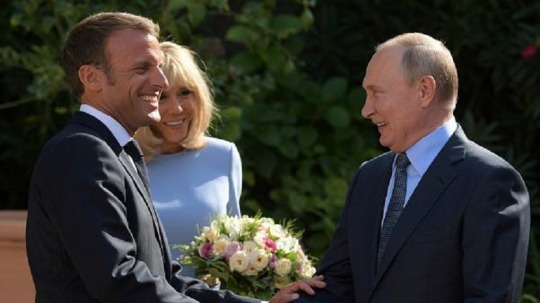
0 notes
Text
Paul Winkler (AU/DE)
Turmoil
2000
17:41
‘The films of Paul Winkler, one of Australia’s most prolific experimentalists, contest prevailing images of landscape as a reflection of national and social cohesion, instead meditating on a disconnection between everyday perception and the Australian environment.’ Alex Gerbaz
‘In his films Winkler is meticulously transposing rules of architectural construction into the building of a visual artifice. These films are like ephemeral pyramids. They are like monuments that we are at time permitted to enter. What lies buried within the inner chamber of a Winkler film is the sarcophagus of Technique itself. For those entering there are innumerable pitfalls lying in wait for the unwary weaned on the warm milk of mainstream cinema.’ Dirk de Bruyn
Quintessa Matranga and Rafael Delacruz and Marc Matchak (US)
Lebenswirklichkeit
2017
26:26
Young artists produce a barely fictional representation of themselves, quoting mumblecore and aspirational dramedy simultaneously. Through the narrative and productive gesture alike a localised situation is created within New York City. Of possibly ambitious young Americans possibly examining their possible careers. The mildest nostalgia is indicated, perhaps to San Francisco pre-dot com or Seattle pre-G8. They look at each other and they look at themselves.
Katherine Botten (AU)
2017
Sunday/ Sexy Young Artist Dominic Will Do ANYTHING To Get Into NEW18: Curator Couch. 2017 Map the world on my world. Map my world on the world.
Starring: Oscar Miller and Dominic Sargent.
Stephen Dillemuth (DE)
Elbsandsteingebirge 1789-1848
1994
50:51
“South of Dresden, the bizarre landscape of the Elbsandsteingebirge served as a treasure trove for the motifs of almost all German romantics. Their paintings today shape our romantic vision of the time between the French Revolution and the March Revolution in Germany. In a journey through pictures, films and texts, to a trip in the Elbe Sandstone Mountains, we are confronted with our own projections: Was the romance political? Or was politics romantic? ”
Josef Strau: That you tried both, and ask if the exhibition is still related? Or has something new opened up?
Stephan Dillemuth: There was also a parallel, as here, for example, the time of the French Revolution and of the Vormarz (the period from 1815 to the March Revolution in 1848, the Red), one could certainly take any other historical section, but it is important That one then comes to different points, which can not be taken as a direct argument for the time, but which at least take up new points of view.
But what else, Schüttpelz has told us that many of the romantics are very young converts to Catholicism because they found this so medieval, and he compared it with the New German wave. It has played in a very funny and liberating way with totally respectable and bourgeois attitudes, but then immediately identified by the success, everything was already over again, and only a stock-conservative and boring story. So question: How can you keep a broken attitude, also against art? Not that the object or the action, for example, would be as it is meant, but if one believes in what results from it, the stability of one’s own attitude, etc., it becomes really serious. Romanticism is always at the beginning when it has something incredulous and playful, and it reacts like a medieval and Catholicism, but also in the sense of Arno Schmidt, to the surrounding chaos, from within me with outwardly protruding inwardness. Someone has also claimed that the aftermath of the French Revolution led to a revolution in art, which was later called Romanticism. But if you believe it again, you land at the Biedermeier.
Charlie Ahearn and Martin Wong (US)
Portrait of Martin Wong
1998
18:00
‘Martin painted the LES ghetto with the most enigmatic realism of bricks to be seen. In 1992 my friend Martin invited me up to his Ridge St apartment as he began his autobiographical Chinatown series reflecting his youth in San Francisco and later New York. After he was diagnosed with HIV he returned to SF where he later passed away in 1999.’ Charlie Ahearn
RIP Martin Wong
Alex Bag (US)
The Artist’s Mind
1996
30:01
‘This is living-dead art, a critical-hysterical acting out of the deodorized-bathroom neurotic, the suicidal biochemical-test subject and the terminal media addict we all recognize as ourselves.’ John Kelsey
‘This is a different time. Puppets and costumes seem funny, relevant. Club culture exists in the same temporal frame, not wedged between the covers of a coffee table book. Limelight is still open. Drugs are still fun/funny. The Internet is too slow for video.’ Rob Mckenzie
In commemoration of Damien Hirst’s 1995 Turner Prize, Bag made The Artist’s Mind, which takes the form of a PBS-style show chronicling a day in the life of a contemporary visual artist. In this episode, aspiring sculptor/painter “Damien Bag” demonstrates his creative process, which begins with eating breakfast, shopping at Wal-Mart and scouring the local highways in search of fresh road kill. Prompted to discuss his work, Damien says his pieces represent “a form of duality” and “a lot of metaphors.”
0rphan Drift (UK)
Bruises
1997
15:05
‘0rphan Drift is a collaborative media artist and avatar that emerged in London, 1994. The video, performances, installations and eponymous cyberpunk novel 0(rphan)d(rift>) addressed the future through the science -fictional, nascent technologies and related shifts in perception and matter-energy. 0D re-emerges in reconfigured form, again addressing the future as it speaks to us in this moment. Considering current narratives around climate change, bio-capital and related migratory patterns they re-imagine the urban as porous, interspecies and terraformed.’
Excerpts from a 30 minute video commissioned, with accompanying slide installation, by Beaconsfield Arts for screening at John Cage ‘Classic’ audiovisual event. Inaugural concert by (rout).
Here the re edit is set to a section of Cage’s album ‘Shock’, and produced on the 0rphan Drift analogue editing suite, complete with MX30 Panasonic mixing desk.
Hana Earles (AU)
$1070
2017
08:00
Working and making art, in the office and in your bedroom.
I could set the building on fire.
You shouldn’t smoke in your bed.
Carolee Schneemann (US)
Interior Scroll - The Cave, 1975 - 1995
1995
07:32
‘In the early ’60s, Schneemann’s “action” paintings, some embedded with images of nude female figures, literally moved from surface to environment, and her staging of work from static objects to interactive events. Along with her colleagues in the Judson Dance Theater, she pioneered crossovers from music, theater, and dance to art. Transferring the orgiastic qualities in her art from paint to the performance of “her own body,” Schneemann broke ground in charged Dionysian extravaganzas that yielded some of the most memorable and challenging images of the period: serpents writhing over her nude body (Eye Body: Thirty-six Transformative Actions, 1963); an erotic flesh fest of entangled bodies, chickens, sausages, and fish (Meat Joy, 1964); a lecture-performance in which she discussed her work and posed questions to an audience such as “Does a woman have intellectual authority?” as she dressed and undressed (Naked Action Lecture, 1968). In Interior Scroll, 1975, she unwound a scroll from her vagina and read a text about “vaginality.” For many, the problem with her exuberant, Reichian-influenced, utopian-tinged abandon, lies in her “performance” of her own body. We need only glance at the historical record for proof that prior to Schneemann, the female body in art was mute and functioned almost exclusively as a mirror of masculine desire. (Think of Yves Klein’s manipulation of nameless female models as voluptuous paintbrushes for the production of his “Anthropométries” series in the early ’60s.) We have done a terrible injustice to ourselves in continuing to marginalize Schneemann as an “angry woman” or “bad girl.” To pigeonhole her art as aberrant is to risk reducing her oeuvre to sensationalism. Schneemann’s blanket of protection from decades of neglect and misrepresentation has been her sheer exuberance and focused search for the real through uberphysicality. I’m not sure that we, the audience, have fared so well.’ Jan Avgikos
Lutz Mommartz and Sigmar Polke (DE)
Der schöne Sigmar
The Beautiful Sigmar
1971
22:44
New Year party with Sigmar Polke at the department of the Kohlhöfers in Düsseldorf / Germany.
‘The films of Lutz Mommartz are each based on a single idea; the effect then is more sustainable, says Lutz Mommartz. These ideas are often brilliant, sharp and provocative, but just as often they lose lot of their radicalism during the realization. Although Lutz Mommartz is a very conscious Filmmaker, his films convey ostensibly the image of a naive author. Lutz Mommartz manages to combine both features in his films. He knows about his enormous naive playfulness, but bringing it under rational control, he uses it consciously. Because he wants to achieve an effect with each film. Film should be a trigger that activates the audience. Although film currently could provide only general climate conditions or lead to climate improvements, but it could not lead to direct political action. The combination of aesthetics and politics rationale appears to him out of place; the commitment would get lost in the art. Lutz Mommartz believes in socialism, but (you should write that!): “Chemistry is the only chance for socialism!” Because 5 % conscious people would always face 95 % inconscious. For Lutz Mommartz there is no form of government that could counteract this. The relationship between these two groups is the only tragedy that there is today. In order to make the relationship bearable Lutz Mommartz sees only one solution: Drugs.’ H.P. Kochenrath
Pauline Senn and Juan Davila (AU)
50:48
‘Juan Davila is a writer, but first and foremost an artist. His controversial work still divides opinions. Davila was born in 1956 in Santiago, Chile, and lives and works in Melbourne, Australia. At the time of the military coup in Chile, when Pinochet seized power from Allende, Davila was part of the art scene there. His paintings in response, some of which appear in the documentary, shocked both those of the political left and right. In this documentary, Juan Davila talks about this period, and about modern art, censorship of expression and the oppression of the Mapuche Indians, the original inhabitants of Chile. He also talks about beauty and the shocking effect of painting it today. Davila has grown reluctant to the idea of being interview, given the failure of the media to address the complexity of his work. For the first time on film he speaks about this in terms of his upbringing - both bourgeois and Indian. We accompany Juan Davila as he revisits his indigenous Mapuche nanny’s daughter, women who have greatly influenced his work. He takes us to the oldest church in Santiago where, as a young buoy, he saw paintings by 17th century Indian artists in the Western manner that would profoundly influence his future work. And we see the artist at work, painting en plein air in a burnt forest at home in Australia.’
Jack Smith (US)
Flaming Creatures
1963
40:43
Sylvère Lotringer :Were you ever competitive? Did you ever believe in that?
Jack Smith: Yes, of course, when you’re young. It’s drilled into you, and you have to slowly find your way out of it, because you find it doesn’t work. Capitalism is terribly inefficient. The insane duplication, the insane waste, and the young only know what’s put in front of them… But then, by experience, things are happening to you and you find out that this doesn’t work. I mean this is not productive. It produces waste. I looked through your magazine and I was repelled by the title. It’s so dry, you just want to throw it in the wastebasket, which I did. Then I picked it out… Listen: Hatred of Capitalism is a good name for that magazine. It’s stunning. I’ll never admit that I thought of it.
SL: I doubt that by saying that directly you’ll change anything. Language is corrupt.
JS: Listen, you are a creature, artistic I can tell, that somehow got hung up on the issue of language. Forget it. It’s thinking. If you can think of a thought in a most pathetic language… Look at what I have to do in order to think of thoughts. I have to forget language. All I can do with no education, nothing, no advice, no common sense in my life, an insane mother I mean, no background, nothing, nothing, and I have to make art, but I know that under these conditions the one thing I had to find out was if I could think of a thought that has never been thought of before, then it could be in language that was never read before. If you can think of something, the language will fall into place
in the most fantastic way, but the thought is what’s going to do it. The language is shit, I mean it’s only there to support a thought. Look at Susan Sontag, that’s a phenomenon that will never occur, only in every hundred years. Anybody like that. She says things that you would never have thought of. And the language is automatically unique. Whatever new thoughts you can think of that the world needs will be automatically clothed in the most radiant language imaginable.
Bonny Poon (CA)
Beautiful Balance
2017
01:07:45
Of Bodies… Borders… Boredom…
A dazzling and debauched cast of zombies interpret the erotic story of heroes, Whitney and Taylor. The setting is Frankfurt am Main, Germany’s financial heart.
“We are very similar.” “A slave?”
Starring:
Nathaniel Monjaret, Adrian Manuel Huber, Aziade Cirlini, Mohamed Almusibli, Chingy Hong, Lili Reynaud-Dewar, Julian Tromp.
1 note
·
View note
Link
The foreign policy issue in American politics has undergone some remarkable shifts over the years. We are in the midst of just such a shift, but before we can properly understand what is happening today we must consult Clio, the muse of history, and see what patterns we can discern.
As witnesses to the birth of the American empire at the turn of the last century, the two major parties staked out roughly opposite positions. As William McKinley and Teddy Roosevelt presided over the acquisition of Hawaii, Puerto Rico, the Philippines and Cuba, it was the Republicans – the party of big business, crony capitalism, and “preparedness” – who waved the banner of expansionism, and the populist Bryanite Democrats who stood for anti-imperialism. This changed with the usurpation of the old Democratic populism by the “progressivism” represented by The New Republic and Woodrow Wilson, whose policies would christen an entire school of foreign policy thought under the rubric of “Wilsonian” internationalism.
It was the backlash against Wilson’s war to “make the world safe for democracy” that the “isolationist” (i.e. anti-interventionist) sentiments of the American people – and both parties – were solidified, at least for a while. “Isolationist” sentiment in Congress was centered in the Republican party, exemplified by the “Irreconcilables,” who opposed US entry into the League of Nations, but anti-interventionism was the default position of both parties in the wake of the Great War.
This bipartisan devotion to the foreign policy of the Founders didn’t last, however: as war clouds gathered once again on the European horizon, the left-wing of the Democratic party in alliance with the Anglophile Establishment on the east coast openly agitated for war with the Axis powers. Arrayed against them were Midwestern progressives and conservative businessmen, with a few libertarian intellectuals thrown in to spice up the pot, known today as the “Old Right.”
As per usual, these disparate stances had less to do with objectively observable national security considerations than with the woof and warp of domestic politics. The Old Right, consisting of conservative Republicans and a constitutionalist remnant of the Democratic party, feared that war would give Franklin Roosevelt and his New Dealers the weapons they needed to consolidate their control of the economy and the country. As libertarian Rose Wilder Lane put it, we’ll “beat national socialism in the trenches and get it on the home front.”
The Democrats, heavily influenced by their far left-wing, were also – ironically – subject to considerable pressure by banking interests, whose holdings of British and other European government bonds were at risk as the Nazis steamrollered across the continent. When Hitler invaded the Soviet Union, and the Communist Party turned on a dime and became the loudest interventionists of them all, the die was cast: the “Great Debate” became a battle between pro-Soviet/pro-British elements versus the nationalist-“isolationist” America First movement.
Pearl Harbor doomed the latter, but the anti-interventionists didn’t immediately fade away. Sen. Robert A. Taft, known as “Mr. Republican,” who led the America First wing of the party until 1953, opposed the formation of NATO. But the cold war was rapidly reversing the polarities of American politics, and the McCarthyite rampage led ineluctably to a turnaround among conservatives on the foreign policy question: they became militant interventionists, with National Review under editor William F. Buckley, Jr., leading the call to “roll back” communism. Meanwhile, the liberal-left abandoned its former militance and advocated – for the most part – détente with the Soviet Union.
With the implosion of international communism and the fall of the Soviet Union, it looked likely for a while that the old “isolationism” of the right would rise again, with Republicans skeptical of Bill Clinton’s Balkan war – but several factors intervened to block this development.
First, our symbiotic relationship with Saudi Arabia and the Gulf states motivated George Herbert Walker Bush to intervene when Saddam Hussein invaded Kuwait: the first Gulf War was the result. The Democrats, for the most part, retained their mildly anti-interventionist position, out of habit, although there were significant defections.
Secondly, and more profoundly, the 9/11 attack intervened, and arrested the development of any anti-interventionist sentiment in both parties for a good while. As was the case in the run up to World War I, war hysteria united both parties, with anti-interventionist dissent consigned to the fringes. The invasion and occupation of Iraq was supported by the leadership of both parties.
When war weariness became a general malaise this led to the election of Barack Obama. While Obama campaigned – and won – on the basis of his antiwar credentials, his presidency was anything but anti-interventionist. His reign was marked by the ascendancy of the “responsibility to protect” faction of Wilsonian internationalists, and he intervened in Libya and Syria on this basis, as well as continuing – and even ratcheting up – the endless “war on terrorism” initiated by his predecessor.
So where are the patterns in this historical pageant? If we go all the way back to the earliest days of the republic, we can see that the foreign policy position of the parties has been determined by their designation of the chief danger to our national security. It is an answer to the question: Who is the “the enemy?”
In the days of Washington and Jefferson, the choices were either the British, or the French: the former represented a domestic danger, as imagined by the Jeffersonians, in the form of the restoration of royalism in America, while the latter, in the Federalist mindset, was the source of an alleged Jacobin menace, which was said to inspire Jefferson and his followers. And so we can see that, from the very beginning, these alleged foreign enemies were merely representations – stand-ins, if you will – of domestic political actors.
The same pattern has persisted throughout our history. In the two world wars, the German “threat” was represented at home by our numerous German-American population, who generally resisted the “progressive” domestic politics of the war-making Wilson and Roosevelt administrations, as well as being solidly “isolationist.” During the cold war communism was The Enemy, and this was merely a projection onto foreign soil of the anti-Communist hysteria whipped up by the McCarthy crusade and the general fear of radicalism and communist “subversion” in the United States.
Now we arrive at the present, where we encounter what may be a unique moment in the history of the politics of US foreign policy.
The projection of domestic bogeymen onto a foreign landscape has persisted to the present day, with one important modification, and it is this: in the past, while one of the parties held up an “enemy” as a dire threat to our national security, the other party defined itself largely in opposition to this. For example, during the cold war era, conservative Republicans wanted to spend billions on the military in the name of meeting the Soviet “threat,” while liberal Democrats responded that the money was better spent at home taking care of our own people. They did not pose an alternative threat. That has now changed.
On the Democratic side of the aisle, The Enemy is Russia. In a curious upending of their mindset in years past, liberal Democrats have become rabid Russophobes who see a Putin “agent” under every bed and bush. The reasons for this are entirely domestic, i.e. political: having fielded a presidential candidate who inspired nothing but either ennui or revulsion, they are intent on finding a reason other than their own incompetence and ideological bankruptcy for Hillary Clinton’s unexpected defeat. They’ve settled on “Russian interference,” i.e. the WikiLeaks revelations of Democratic corruption, and are now embarked on a campaign – in tandem with their many friends in the mainstream media – to target President Donald Trump as an outright agent of the Kremlin.
This is what motivates their demands that the President “do something” about the alleged ‘”threat” posed by Putin to our European allies, and their insistence that we must strengthen and expand NATO, and unconditionally support one of the most corrupt and illiberal regimes in Europe, namely Ukraine. Their response to Trump’s desire to improve relations with Russia is to denounce him as “Putin’s puppet.”
As for the Republicans, the aftereffects of 9/11 are still quite strong: the result is that they define The Enemy as “radical Islamic terrorism.” Again, this is a representation, in large part, of an alleged threat that is said to exist domestically. This threat is then projected onto an overseas screen, either ISIS (in Syria) or al-Qaeda (in, say, Yemen). Never mind that, aside from the 9/11 attackers and a few others, most of the worst terrorist incidents that have occurred have been carried out by US citizens who are second generation immigrants. In this sense, Republican foreign policy has become a form of “security theater.”
Furthermore, “radical Islamic terrorism” is a very broad term that, as used by President Trump, encompasses the Shi’ite version of Islam, the adherents of which have never carried out a single attack in the United States. Indeed, Iran – the seat of Shi’ite power – is engaged in a vicious war with the Sunni Islamists, in Syria and elsewhere. Yet the Trump administration persists in labeling Iran “the single biggest exporter of terrorism” in the world – a designation that blanks out the substantial role played by the Sunni rulers of Saudi Arabia in exporting the radical Islamist ideology that motivates both ISIS and al-Qaeda.
And while Trump has given voice to more than a few anti-interventionist sentiments – he’s against “regime change,” he’s skeptical of NATO, he wants to “get along with Russia,” and he claims to represent a foreign policy that puts “America first” – under his administration the historical pattern persists. The only difference is his choice of enemies.
This puts us anti-interventionists is a perilous position: both parties are pushing a war agenda, with the only difference being the target of American bombs.
Now one could argue – as I have in these pages – that Trump’s ostensible reluctance to repeat the mistakes of the past gives us some degree of leverage. And it is true that, in trying to repair relations with Russia, and avoid the terrible consequences of conflict with that nuclear-armed power, the President has stuck his neck out and taken a very big political risk. Yet the fact remains that the targeting of Iran – exhibited, so far, in terms of pure bombast – represents a clear and present danger to the peace of the world.
And so we are between a rock and a hard place. If the Democrats win, we get World War III with Russia: if the Republicans win, we get a reiteration of our endless “war on terrorism.”
That’s why Antiwar.com is more essential than ever – because the danger of war has never been greater. With both parties pushing a war agenda, the political space for anti-interventionists is considerably narrowed.
But that doesn’t mean that the politics of foreign policy is tilted against us: that’s because we have the support of the war-weary public, which is sick and tired of foreign wars and cares not one whit about either alleged Russian “aggression” in some faraway country or whether ISIS is in Mosul or Mauritania. The natural “isolationism” of the average American is our greatest asset and ally, and we here at Antiwar.com are intent on taking full advantage of it. But we can’t do that without your support – your financial support.
The War Party has a bottomless treasury: they not only have the enormous resources of the US government, they also can count on the boundless generosity of the war profiteers, what President Eisenhower dubbed the military-industrial complex. They also have the media in their pocket, which is always eager to broadcast “fake news” designed to lure us onto foreign battlefields.
We, on the other hand, just have you – our readers and supporters. We depend on you for the resources we need to keep this web site going. And we’re reaching out to you once again, asking you to vote with your pocketbooks.
We’ve been at this for over twenty years, and never in that time has the need for Antiwar.com been greater. Please help us fight the War Party. Make your tax-deductible donation today.
6 notes
·
View notes